
A publication of the Arkansas Bar Association
Vol. 59, No. 1, Winter 2024
Lawyer The Arkansas
ADMINISTERED BY: Products sold and serviced by Business Planning Concepts, Inc dba Member Benefits, the program administrator. The Arkansas Bar Association is not a licensed insurance entity and does not sell insurance. Learn more about your benefits today. memberbenefits.com/arkbar 800-282-8626 Are you taking advantage of the benefits you've earned? The ArkBar Insurance Marketplace offers a broad level of benefits choices, from Health and Dental to Disability and Term Life Insurance. You and your firm have access to concierge-level support, convenient enrollment technology, and unique cost-savings opportunities designed exclusively for ArkBar members, their staff, and their eligible dependents. INSURANCE MARKETPLACE Medicare Supplement Long-Term Care Group Benefits Long-Term Disability Telehealth Dental & Vision Health Term Life ID Theft Protection Pet Insurance
PUBLISHER
Arkansas
Phone:
EDITOR
Anna K. Hubbard
EXECUTIVE DIRECTOR
Karen K. Hutchins
PROOFREADER
Cathy Underwood
EDITORIAL BOARD
Caroline R. Boch
Anton L. Janik, Jr.
Jim L. Julian
Drake Mann
Tyler D. Mlakar
Gordon S. Rather, Jr.
William A. Waddell, Jr., Chair
Brett D. Watson
Amie K. Wilcox
David H. Williams
Nicole M. Winters
OFFICERS
President
Margaret Dobson
President-Elect
Kristin L. Pawlik
Immediate Past President
Joe F. Kolb
President-Elect Designee
Jamie Huffman Jones
Secretary
Glen Hoggard
Treasurer
Brant Perkins
Parliamentarian
Brent J. Eubanks
YLS Chair
Caroline Kelley
BAR ASSOCIATION STAFF
Executive Director
Karen K. Hutchins
Director of Operations
Kristen Frye
Finance Administrator/CPA
Staci Clark Director of Government Affairs
Leah Donovan
Publications Director
Anna Hubbard
Executive Administrative Assistant
Michele Glasgow Office & Data Administrator
Cynthia Barnes
Administrative Assistance for Events
Donyale Morris
Business Support Administrator
Lisa McCormick





10
Considering Retirement? A Checklist for Landing the Plane
By William A. Waddell,
Jr. and David H. Williams
16
A Primer on Elder Law in Arkansas
By M. Gayle Corley
20
"A Fine Line"—Strategies for Engaging in Succession Planning without Violating the ADEA
By Michelle Kaemmerling
26
Guardianships for the Elderly
By Frank LaPorte-Jenner
30
Undue Influence and the Aged
By Caleb D. Hollinger
of the Arkansas Bar Association $35.00 per year. Any opinion expressed herein is that of the author, and not necessarily that of the Arkansas Bar Association or The Arkansas Lawyer Contributions to The Arkansas Lawyer are welcome and should be sent to Anna Hubbard, Editor, ahubbard@arkbar.com. All inquiries regarding advertising should be sent to Editor, The Arkansas Lawyer, at the above address. Copyright 2024, Arkansas Bar Association. All rights reserved.
Lawyer The Arkansas Vol. 59, No. 1 features
Bar
Association
Fax: (501)
www.arkbar.com
(501) 375-4606
421-0732
The Arkansas Lawyer (USPS 546-040) is published quarterly by the Arkansas Bar Association. Periodicals postage paid at Little Rock, Arkansas. POSTMASTER: send address changes to The Arkansas Lawyer, 2224 Cottondale Lane, Little Rock, Arkansas 72202. Subscription price to nonmembers
Contents Continued on Page 2

President: Margaret Dobson; President-Elect: Kristin L. Pawlik; Immediate Past President: Joe F. Kolb; President-Elect Designee: Jamie Huffman Jones; Secretary: Glen Hoggard; Treasurer: Brant Perkins; Parliamentarian: Brent J. Eubanks; YLS Chair: Caroline Kelley
Trustees:
District A1: Geoff Hamby, William M. Prettyman, Timothy R. Scott, Lindsey C. Vechik
District A2-A3: Matthew Benson, Evelyn E. Brooks, Jason M. Hatfield, Christopher M. Hussein, Michelle Rene' Jaskolski, Sarah C. Jewell, George Rozzell, Russell B. Winburn
District A4: Kelsey K. Bardwell, Craig L. Cook, Brinkley B. Cook-Campbell, Dusti Standridge
District B: Michael S. Bingham, Randall L. Bynum, Thomas M. Carpenter, Tim J. Cullen, Bob Edwards, John A. Ellis, Bobby Forrest, Michael K. Goswami, Steven P. Harrelson, Michael M. Harrison, Jim Jackson, Anton L. Janik, Jr., Victoria Leigh, William C. Mann III, Skye Martin, Kathleen M. McDonald, J. Cliff McKinney II, Jeremy M. McNabb, Molly M. McNulty, Meredith S. Moore, John Ogles, Casey Rockwell, Aaron L. Squyres, Jessica Virden Mallett, Danyelle J. Walker, Brett Austin Whitley, Patrick D. Wilson, George R. Wise
District C5: William A. “Bill ” Arnold, Joe A. Denton, John T. Henderson, Todd C. Watson
District C6: Bryce Cook, Paul N. Ford, Paul D. Waddell, Jeffrey W. Puryear
District C7: Kandice A. Bell, Robert G. Bridewell, Sterling T. Chaney, Taylor A. King
Delegate District C8: Carol C. Dalby, Amy Freedman, Connie L. Grace, Wm. Blake Montgomery
Ex-officio Members: Judge Mackie Pierce, Judge Chaney W. Taylor, Michael H. Crawford, Dean Cynthia Nance, Dean Colin Crawford, Denise Reid Hoggard, Eddie H. Walker, Jr., Christopher M. Hussein, Karen K. Hutchins
2 The Arkansas Lawyer www/arkbar.com
Vol. 59, No. 1 in this issue President’s Report 7 Margaret Dobson Young Lawyers Section Report 9 Caroline Kelley columns ArkBar News 4 Third Public Service Academy 8 In Memoriam 35 Arkansas Bar Foundation 36 Disciplinary Actions 38
Lawyer The Arkansas
Board of Trustees Advertise in the next issue of The Arkansas Lawyer https://www.arkbar.com/ about-arkbar/advertising MUSIC AND THE LAW ISSUE Five Bagatelles at Law Up Around the Bend SIDE Musical Notes Members’ Jam Judicial Harmony publication of the Arkansas Bar Association Lawyer The Arkansas

Vol. 59 No. 1/Winter 2024 The Arkansas Lawyer 3 Built by LAWYERS, Powered by PROS® Strength & Experience Your employees are your firm’s greatest asset — financial wellness is one of their greatest needs. The ABA Retirement Funds Program is designed specifically for the retirement needs of the legal community. We address many top concerns, like: Get started today! abaretirement.com • 800.826.8901 • joinus@abaretirement.com https://abaretirement.com Revenue Transparency in retirement plan assets $6.4B law firms and legal organizations 3.9K lawyers and legal professionals 37K Fiduciary Protection Governance Employee Retention As of 12/31/2022 A member benefit of the: The ABA Retirement Funds Program is available through the Arkansas Bar Association as a member benefit. Please read the Program Annual Disclosure Document (April 2023) carefully before investing. This Disclosure Document contains important information about the Program and investment options. For email inquiries, contact us at: joinus@abaretirement.com. Registered representative of Voya Financial Partners, LLC (member SIPC). Voya Financial Partners is a member of the Voya family of companies (“Voya”). Voya, the ABA Retirement Funds, and the Arkansas Bar Association are separate, unaffiliated entities, and not responsible for one another’s products and services. CN3115318_0925
ArkBar Welcomes Two New Staff Members

The Arkansas Bar Association is pleased to announce that Leah Donovan has been named the new Director of Government Relations for the statewide organization.
“Leah’s experience will be invaluable in leading the Association’s government relations efforts,” said Executive Director Karen K. Hutchins. “Her established relationships and well-respected reputation at the State Capitol will help further the mission of the Association. Her experience in governmental public relations and work with nonprofits will expand the Association’s support of more than 5,000 members. We are happy to have Leah join our team.”
Leah previously served as a Legislative Analyst for the Arkansas House of Representatives. During session she also served as Engrossing Clerk, where she was responsible for formatting amendments to bills, resolutions, and other legislative documents.
A native of Fayetteville, Leah earned her Bachelor’s degree in English/Creative writing from the University of Arkansas and her Master’s in Public Administration from the University of Arkansas at Little Rock.
ArkBar's Mid-Year 2024 Meeting
ArkBar hosted its Mid-Year meeting at the Aloft Hotel in Little Rock February 6-9, 2024. The meeting added new CLE tracks this year, Debtor-Creditor and Construction Law, to the popular transactional tracks—Tax Law, Probate & Trust and Elder Law. Thank you to our speakers, planners, attendees, sponsors and exhibitors for making the meeting a success!
• Gold Sponsor (Probate & Trust Track): Simmons Bank Private Wealth
• Debtor-Creditor Track Happy Hour Sponsor: the Debtor Creditor Bar of Central Arkansas
• Construction Law Track Welcome and Lunch sponsor: Newland & Associates, PLLC
• Annual Sponsors
• Debtor-Creditor Law Planners: Kellie Emerson, William Godbold, Amanda Pace Welch and Mary-Tipton Thalheimer
• Tax Law Planners: Wade Bowen, Michael Pollock, Hannah Van Horn
• Construction Law Planners: JB Cross, Price Feland, Evan Lawrence
• Probate & Trust Law Planners: David Bingham, Robert Beach, and Leon Jones
• Elder Law Planners: Trae Norton and Ashley Stepps

Lisa McCormick joins us as the Association’s Business Support Administrator. Her experience working with attorneys will be an asset to ArkBar. “Lisa has great communication skills and is very detail-oriented, which will serve her well as she organizes ArkBar meetings, handles CLE registrations, coordinates speaker information for annual meetings, and assists with the Hall of Fame program,” said Kristen Frye, ArkBar’s Director of Operations. Her background in paralegal studies makes her particularly suited to serve as staff liaison to our paralegal affiliate members.”
A native of Arkansas, Lisa recently graduated from Purdue Global with a bachelor’s degree in legal studies and services. Prior to that, she earned an associate degree in paralegal technology from the University of Arkansas Pulaski Tech. Lisa has a son and daughter, and enjoys watching the Razorback baseball team, reading books, and cross-stitching. Her favorite season is baseball season.
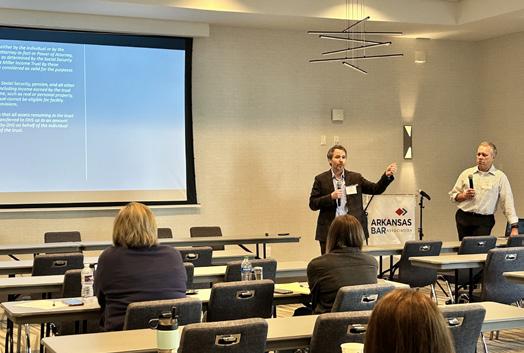



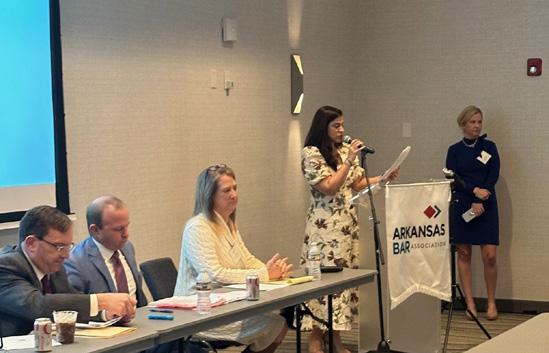

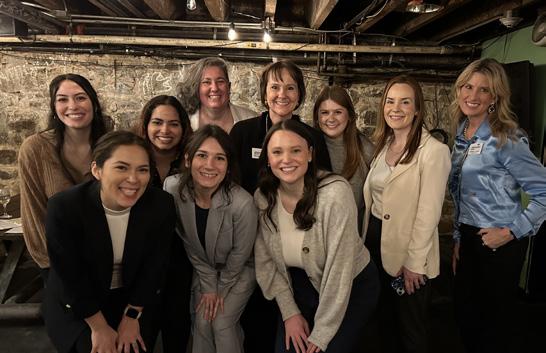
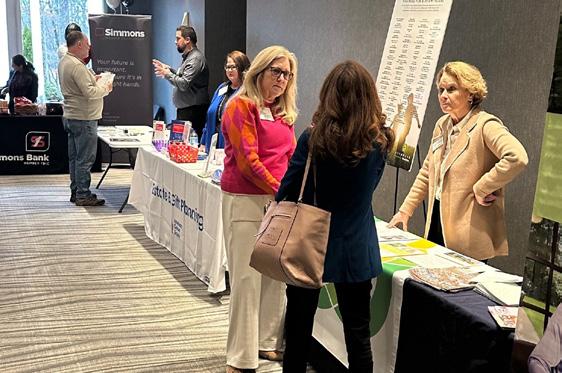
4 The Arkansas Lawyer www/arkbar.com ArkBar News
Leah Donovan
Lisa McCormick
Oyez! Oyez!

WORD ABOUT TOWN
Taylor King Law announced the addition of three new attorneys: Conrad Odom, Russell Winburn, and Chad Owens. Arkansas Access to Justice Commission and Foundation announced Abby Brenneman as the new Executive Director starting January 10. RiverWind Bank announced the promotion of Casey Cullipher to Chief Executive Officer and President. Hall Booth Smith announced that Sarai Medrano and Julie Hill joined its Little Rock office. Rose Law Firm announced that Betsy Baker will lead the firm’s litigation practice section effective February 1, and that Nicole Gore and Ryan Smith are its newest members. Quattlebaum, Grooms & Tull PLLC announced that Shelley Fleisch-Djurica has been named a member of the law firm. Friday, Eldredge & Clark announced Lindsey Emerson Raines as 2024 Partner Election.
Send your oyez to ahubbard@arkbar.com
Ballots Due March 4, 2024 for ArkBar 2024 Elections

Ballots for positions on the Board of Trustees were distributed Monday, February 12, 2024, and voting ends on March 4, 2024. Members from District A1 (Benton Co), A2-3 (Washington Co), B (Pulaski Co), and C5 (candidates from Batesville and Searcy) will elect Trustees.
The filing deadline for 20 Board of Trustees seats and the office of Secretary was January 29th. 24 candidates filed for Trustee resulting in 4 contested races. Pursuant to ArkBar's Constitution, petitions for Board of Trustees and Secretary were filed by January 29, 2024. Secretary Hoggard certified the following petitions:
District: Candidate
A1: Elizabeth Esparza
A1: Ryan Scott
A2, A3: Evelyn Brooks
A2, A3: Joey McGehee
A2, A3: George Rozzell
A2, A3: Russell Winburn
B9-15: Mark Cameron
B9-15: Caitlin Campbell
B9-15: Steve Harrelson
B9-15: Michael Harrison
B9-15: Anton Janik
B9-15: Cliff McKinney
B9-15: Lauren Spencer
B9-15: Aaron Squyres
B9-15: Danyelle Walker
B9-15: Patrick Wilson
C5: Kim Edington
C5: Brett Watson
Deadline for submission of Annual Award Nominations
Wednesday, March 13, 2024

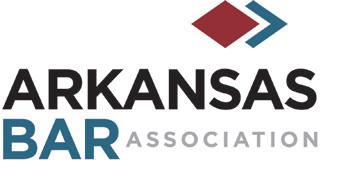

It is time to nominate deserving candidates for this year’s Arkansas Bar Foundation and Arkansas Bar Association Annual Joint Awards. The awards open for nomination are:
• Outstanding Lawyer Award
• Outstanding Lawyer-Citizen Award
• C.E. Ransick Award of Excellence
• James H. McKenzie Professionalism Award
• Equal Justice Distinguished Service Award
• Outstanding Jurist Award
• Outstanding Local Bar Association
These awards will be presented at the Annual Meeting in June. You are encouraged to nominate Arkansas lawyers, judges and local bar associations who deserve recognition. Nomination forms may be submitted by any Association member or Foundation Fellow. Forms are available at https:// www.arkbar.com/members/award-nominations or you may submit a written letter of nomination to Ann Pyle at the Arkansas Bar Foundation at 2224 Cottondale Lane, Little Rock, Arkansas 72202. Please call Ann Pyle at 501-801-5670 with any questions.
Vol. 59 No. 1/Winter 2024 The Arkansas Lawyer 5
Scan QR Code to submit award nomination


SAVE THE DATE

2024 2024 ANNUAL ANNUAL MEETING MEETING RETREAT
JUNE 12-14, 2024
HOT SPRINGS
HOT SPRINGS CONVENTION CENTER & OAKLAWN EVENT CENTER
JOINT MEETING WITH THE ARKANSAS JUDICIAL COUNCIL
HOT SPRINGS
WHERE TRADITION MEETS TOMORROW
JOIN US FOR AN UNFORGETTABLE 126TH ANNUAL MEETING OF THE ARKANSAS BAR ASSOCIATION! THIS YEAR’S MEETING PROMISES A PERFECT BLEND OF STREAM-LINED, CUTTING-EDGE CLE AND MORE FUN AND ENTERTAINMENT THAN EVER BEFORE.
COME ON! JOIN THE FUN & EARN CLE

Scan QR code for more information.
Agenda and registration coming soon!


The Arkansas Bar Association and the University of Arkansas Clinton School of Public Service, in association with the University of Arkansas Little Rock Bowen School of Law and the University of Arkansas School of Law, are proud to announce the third class of the Public Service Academy. The Public Service Academy was established to provide serviceminded lawyers and law students the tools they need, both for service in elected office and as volunteers. The following individuals participated in the first of two sessions in Little Rock January 19-20, 2024, and will participate in the second one in Fayetteville March 8-9, 2024.
• Zach Baumgarten, Veterans Legal Services Clinic, UA Little Rock William H. Bowen School of Law
• Seth Bickett, Bickett & Trentham Law Partners, LLP, Bentonville
• Jack Curtis, Student, University of Arkansas School of Law
• Sharnae Diggs, Mitchell, Williams, Selig, Gates & Woodyard, P.L.L.C., Little Rock
• Hank Felton, Legacy Law Group, Hot Springs
• Mallory Floyd, The Association of

Arkansas Counties, Little Rock
• Bobby Forrest, Chosen Law Group, Little Rock
• Richmond Giles, Arkansas Public Employees’ Retirement System, Little Rock
• Kimberly Glover, Mitchell, Williams, Selig, Gates & Woodyard, P.L.L.C., Little Rock
• Taylor Handford, Student, UA Little Rock William H. Bowen
School of Law
• Joanie Harp, Arkansas Supreme Court, Little Rock
• Kate Hill, Miller, Butler, Schneider, Pawlik & Rozzell, PLLC, Rogers
• Andrew (Hal) Hoggard, Student, UA Little Rock William H. Bowen
School of Law
• Kandi Hughes, Midcontinent Independent System Operator (MISO), Little Rock
• Michelle Jaskolski, Jaskolski Law Firm, Fayetteville
• Caroline Kelley, Mitchell, Williams, Selig, Gates & Woodyard, P.L.L.C., Rogers
• Frank LaPorte-Jenner, LaPorteJenner Law, PLLC, Little Rock
• Jacobi Malone, Proctor & Malone Law Firm, Little Rock
• Miriam Martinez, Martinez Law Firm PLLC, Rogers
• Paula Martucci, Attorney at Law, Bentonville
• Lindsay Mast, Student, University of Arkansas School of Law
• Selby McCollett, Student, UA Little Rock William H. Bowen School of Law
• Samuel McLelland, PPGMR Law, Little Rock
• Drake Moudy, Student, UA Little Rock William H. Bowen School of Law
• Courtney Nosari-Wall, Deputy General Counsel, Arkansas Department of Corrections, Little Rock
• Emma Parr, Student, University of Arkansas School of Law
• Victor Pulido-Rojas, Student, University of Arkansas School of Law, Fayetteville
• Jessica Ratcliffe, Saline County Public Defender Office, Hot Springs
• Addison Tucker, Student, University of Arkansas School of Law
• Tiffany Tucker, Farrar & Williams, PLLC, Hot Springs
• Lindsey Vechik, Tyson, Rogers
• Peyton Watts, Kutak Rock LLP, Fayetteville
• Amie Schoeppel Wilcox, Friday, Eldredge & Clark, LLP, Little Rock
The Public Service Academy is chaired by Skye Martin and Madhav Shroff, with assistance from vice-chairs Caitlin Campbell and Trent Minner. The Steering Committee consists of: Former Chief Justice Howard Brill, Vincent Foster Professor of Legal Ethics & Professional Responsibility at the U of A School of Law; Circuit Judge Earnest Brown; House Speaker Matthew Shepherd; Nate Looney; and Michael Goswami.
The Public Service Academy is sponsored by ArkBar’s Government Practice Section and Juvenile Justice and Child Welfare Law Section, Rose Law Firm, Brian Rosenthal, University of Arkansas School of Law and the University of Arkansas at Little Rock William H. Bowen School of Law. ■
8 The Arkansas Lawyer www/arkbar.com
more information visit https://www.arkbar.com/cle--events/public-service-academy
Participants at the first session of the academy at the Clinton School of Public Service in January.
For
Navigating Exciting Times
I hope this message finds you well as we reflect on the exciting developments that have unfolded within our vibrant community over the past few months. As Chair of the Young Lawyers Section (YLS) of the Arkansas Bar Association, I am thrilled to share the latest updates and invite you to join us in the upcoming events that promise to make this spring season one for the books.
In the spirit of community outreach and legal support, we recently collaborated with Arkansas Access to Justice to host free legal answers clinics in both Rogers and Little Rock. On November 16, 2023, and November 29, 2023, respectively, our members came together to provide valuable assistance to those in need. In total, we were able to help 50 Arkansans in need. It was heartening to witness the dedication of our young lawyers in making a positive impact on the lives of others.
Adding to the list of significant engagements, I had the privilege of attending the Arkansas Bar Association Board of Trustees Meeting in El Dorado on November 30, 2023, and December 1, 2023. It was a fantastic opportunity to connect with fellow legal professionals, fostering camaraderie and exchanging ideas that will undoubtedly shape the future of our legal landscape. Meeting young members during the event was particularly inspiring, reinforcing the strength and dynamism of our community.
On February 8, 2024, YLS hosted a reception at the Flying Saucer in Little Rock. It was great to see so many young lawyers and law students. We appreciate the support from the UA Little Rock Bowen School of Law Student Bar Association. It was an evening filled with laughter, networking, and the shared enthusiasm that defines the spirit of YLS.
Excitingly, we have a service project in the works for this spring, and we cannot wait to
reveal the details soon. Our commitment to making a positive impact on the community remains unwavering, and we look forward to your active participation.
In our ongoing efforts to connect with members across the state, we are planning to organize YLS-sponsored happy hours in Jonesboro and Texarkana. This provides a fantastic opportunity for us to meet and engage with members in different regions, strengthening the bonds that make our section truly exceptional.
Save the date for the highlight of our calendar year—the Annual Meeting YLS Party on June 13, 2024, at Oaklawn Resort in Hot Springs. This year, we aim to make it bigger and better than ever before, ensuring a night of celebration and connection that will be remembered for years to come.
As we navigate through these exciting times, I am continually inspired by the passion and dedication of our YLS members. Your commitment to making a difference in



the legal profession and the community is the driving force behind our success.
Thank you for being an integral part of the Young Lawyers Section. I look forward to seeing you at our upcoming events and celebrating the incredible journey we are on together.
For inquiries or further information, please feel free to reach out to Caroline Kelley at ckelley@mwlaw.com. ■

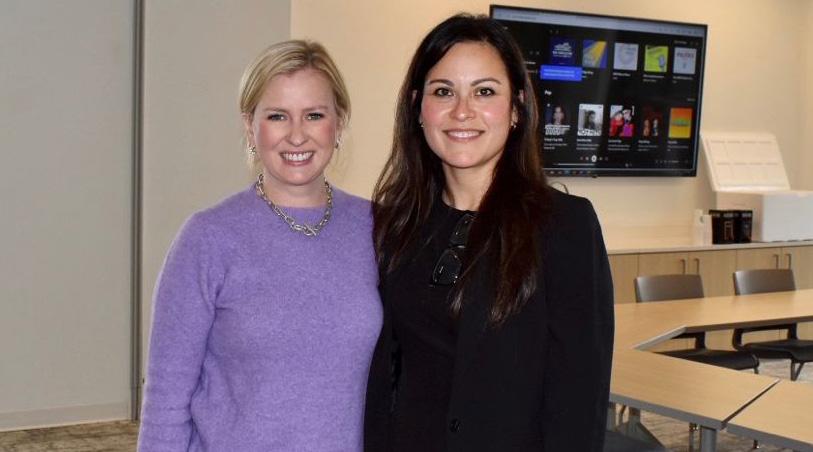

Vol. 59 No. 1/Winter 2024 The Arkansas Lawyer 9
YOUNG LAWYERS SECTION REPORT
Caroline Kelley is the Chair of the Young Lawyers Section. She is an attorney at the Mitchell Williams Law Firm.
Free Legal Answers Clinic Free Legal Answers Clinic
Leah Donovan, Margaret Dobson, Caroline and Kristin Pawlik at the YLS Mid-Year reception
Caroline and Edith Chavez De Oseguera at the Free Legal Answers Clinic
Dean Colin Crawford, Jamie Jones, Chris Hussein, Caroline and Margaret at the District C Board of Trustees meeting
Considering Retirement? A Checklist for Landing the Plane
By William A. Waddell, Jr. and David H. Williams

Introduction
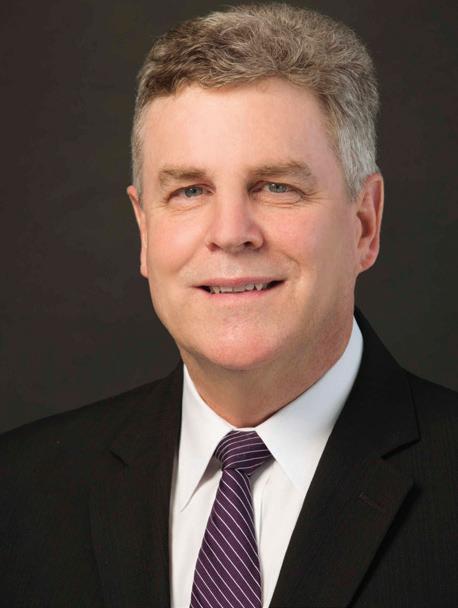

This article discusses the issues that an attorney needs to consider as she contemplates retirement and closing her practice. If the reader believes she has fully retired and has already closed her practice, the article perhaps notes a thing or two that were overlooked and need to be cinched up.
Until the bar association has developed a more formal checklist, we note these important considerations. They are not provided to establish any requirements or standards of care, only to discuss our personal views. They are not intended as legal advice, and they should not be relied upon as opinions that suggest any sort of safe haven or guarantee of any sort of result if they are followed. Each attorney’s circumstances are different and require the exercise of reason, diligence, and judgment appropriate to the particular situation.
Our overall point is that closing a law practice is not merely a matter of turning out the light on a selected date; rather retirement is more like carefully landing a plane with the appropriate runway. So, in preparation for landing, please make sure your professional seatbelt is securely fastened and check off these things. And remain seated until the seatbelt light has been turned off.
10 The Arkansas Lawyer www/arkbar.com
William A. Waddell, Jr., is a partner at Friday, Eldredge & Clark LLP in Little Rock. He is a member of the firm’s litigation practice group.
David H. Williams recently retired after 45 years of solo practice with the Law Offices of David H. Williams in Little Rock.
The Checklist, or The Approach to the Runway
The following checklist includes basic considerations for a retiring lawyer and the closure of a law practice. It does not address issues related to the sale of a law practice or a particular firm’s procedures applicable to an attorney going of counsel. Neither does it address the situation of a lawyer with diminished capacity or a disabling illness. A lawyer should consult both the Arkansas Rules of Professional Conduct and other focused resources in those situations.1 However, a number of the considerations are helpful to any attorney who is discontinuing the practice of law.
Addressing Active and Dormant Matters Handled for Clients
Long before the actual date of retirement or practice closure, the attorney should create a list of all engagements that have been undertaken, whether active or dormant. Some lawyers have a practice of sending a disengagement letter to the client when a particular matter is completed or discontinued. If that is not the lawyer’s practice, then the task of identifying all open matters may require a little more work if there is any question about whether the matter is concluded and the engagement has ended.
For cases pending in court or before some other body such as a regulatory entity, it is usually a simple matter to determine if the matter has ended. However, even court proceedings can be dormant but still pending. For example, a lawyer may have handled guardianships on a pro bono basis. Minor guardianships remain pending until the child turns 18. Adult guardianships can remain open for decades, particularly if the adult was a disabled 18-year-old when the guardianship was established. If the guardianship remains open and the lawyer is the attorney of record, she will likely continue to receive notices about annual reports and other matters.
For any pending case, whether active or dormant, it is important to withdraw before closing the law practice and retiring. This will usually require a motion to withdraw, client consent, and an order permitting the withdrawal and relieving the lawyer of further responsibility, all in accordance with Rule 1.16 of the Arkansas Rules of Professional Conduct. For most cases, this will be in conjunction with another attorney being substituted for the lawyer as the attorney of record.
However, in situations involving an active but dormant matter such as a guardianship, it may be important to have an explanatory letter and in-person conference with the client to help the person serving as a guardian understand and acknowledge ongoing responsibilities.
For court proceedings, it may be useful to transition from open-ended representation to a limited scope engagement as the lawyer moves toward retirement. Arkansas Rule of Civil Procedure 87 provides the procedure for such engagements. Once complete, the engagement is ended by a simple filing with the court.
For lawyers engaged in transactional matters that do not involve a legal proceeding, determining whether a matter is completed is usually accomplished simply by whether an agreement has been signed and performed. However, if there
is any question about whether the lawyer has any continuing obligation to the client, that should be addressed proactively with the client in order to ensure that the representation has been terminated in accordance with Rule 1.16.
Similarly, if the lawyer has any continuing engagements in which she provides general advice to a client, she should confer with the client and determine an end to the engagement.
In every termination of any engagement, Rule 1.16(d) requires the following:
Upon termination of representation, a lawyer shall take steps to the extent reasonably practicable to protect a client’s interests, such as giving reasonable notice to the client, allowing time for employment of other counsel, surrendering papers and property to which the client is entitled and refunding any advance payment of fee or expense that has not been earned or incurred. The lawyer may retain papers relating to the client to the extent permitted by other law.
As this rule indicates, client files are a highly important part of retiring and closing a law practice. For those retiring in 2024, client files are often a mix of paper and electronic records. And some files may be stored remotely (e.g., in the “cloud”) with a third party. A clear agreement should be reached with the client regarding access to client papers and files, preferably transferring everything at the time the engagement is terminated. If that has not been done for an engagement previously terminated and the files are being maintained for at least five years pursuant to Rule 1.19(b), arrangements should be made to maintain the files for that period before they are destroyed. Some files may need to be preserved for longer periods, and this should be addressed with the client. If the attorney either does not want to or cannot maintain a file on a long-term basis, the file may be returned to the client or handled in another acceptable manner. However, if stored by the attorney, the client’s confidential information must be protected even after the attorney’s retirement and the closing of the practice. This may require ongoing financial arrangements with third parties, including those who already maintain confidential client information and presumably have some access to that information in their contracted capacity.2
Finally, at some point in the process of retiring and closing a law practice, the lawyer should stop taking new matters or at least have a co-counsel that the client understands will assume sole responsibility for the matter when the lawyer retires. Again, clear agreements, preferably in writing, are essential to a smooth transition to retirement.
Personal Legal Roles
Attorneys sometimes agree to serve as registered agents, guardians, or trustees as accommodations to clients or perhaps for compensation. In addition, attorneys are also set to become executors, guardians, and trustees in the future as a part of a client’s estate planning. And finally, it is not uncommon for a lawyer to sit as a board member for a client’s corporate entity.
Vol. 59 No. 1/Winter 2024 The Arkansas Lawyer 11
"In Spanish, the most often used word for retirement is jubilación, which captures the positive emotional aspect of retirement. The foregoing steps we have addressed are ones that are intended to land the plane of law practice securely, confidently, and, most of all, to a place of jubilation."
The lawyer may be willing to continue to serve in these roles after retirement, but if there is any question about the lawyer’s role as a legal advisor, that should be cleared up before the attorney’s retirement and the closing of the law practice. As a matter of fact, attorneys not considering retirement should also make sure that the role of the attorney outside an active client engagement is clear to avoid professional malpractice claims. If the client’s corporate entity is also a client and the lawyer serves as a board member, compliance with the safeguards noted in Rule 1.13 is prudent, particularly as the lawyer nears retirement.
In case the attorney may have forgotten, or did not know, that she is listed as the registered agent for a client or former client at the Arkansas Secretary of State, a registered agent search should be conducted and the client or former client should be notified that the attorney is resigning as registered agent, followed by submitting an online resignation through the Secretary of State’s portal.
Professional Malpractice Coverage
As retirement nears, the lawyer should also consult her insurance agent concerning the requirements for reporting claims before retirement and for making sure that claims after retirement are covered. Extended reporting endorsements (sometimes referred to as “tail coverage”) for set periods of time (i.e., the statute of limitations) or unlimited periods may be available, depending upon your insurance carrier and the terms of your policy. Not all malpractice policies are the same, and anecdotal advice from other lawyers who have retired can be irrelevant and unreliable. The insurance policy and the lawyer’s particular situation are the only things that matter, and ignoring the issue
is not wise. An in-person conference with the lawyer’s insurance agent is recommended.
The current state of the law in Arkansas makes this conference and related measures to avoid future malpractice claims even more significant. In the recent case of Nichols v. Swindoll, 3 the Arkansas Supreme Court noted that until an attorney discloses facts of potential malpractice, a client can argue, at the pleading stage, that there was fraudulent concealment that tolled the statute of limitations:
By doing so, neither we nor the circuit court can properly conclude that Nichols failed to allege facts to support a claim of fraudulent concealment when her attorneys had a duty to inform her of their malpractice when they learned of it. See Norfleet, 180 Ark. at 168, 20 S.W.2d at 870; see also Restatement (Third) of the Law Governing Lawyers § 20 cmt. c; see also Ark. R. Prof’l Conduct 1.4 cmt. 7. Because attorneys owe a fiduciary duty to their clients, “a client is not required to maintain a double layer of lawyers to ensure that the fiduciary responsibilities of the primary lawyer are being honored. (And is a third lawyer needed to ensure the second lawyer properly monitors the first one? And so on.”) Nichols v. Swindoll, 2022 Ark. App. 399, at 8 (Harrison, C.J., dissenting).4
Most of the attorneys we know who become aware of an error that could lead to a malpractice claim will address
it promptly with the client. If a retiring attorney knows that such an error occurred and was addressed with the client, it may be prudent to document that in writing (at least in the lawyer’s file) and disclose it to the malpractice carrier. If it was not addressed, Nichols v. Swindoll implies that it should be addressed in order for the running of the statute of limitations to begin. No matter the situation, it is important for the retiring lawyer to purchase tail coverage for malpractice claims that may arise after retirement and the closing of the law practice.
Professional Obligations Regarding Your IOLTA Account
Jordan Bates-Rogers, the former executive director of the Arkansas Access to Justice Foundation, has recently given helpful advice on closing a lawyer’s IOLTA account and related professional obligations.5 He states, “One of the most common mistakes attorneys make when retiring or leaving private practice is leaving their IOLTA account open.” BatesRogers also notes that attorneys in a firm that manages an IOLTA account for the attorneys in the firm need to complete a change of status form available at www. arkansasjustice.org/IOLTA when retiring.
It may be prudent to have the attorney’s accountant prepare a final audit and reconciliation of the IOLTA account to document that all funds have been properly disbursed and that the lawyer has complied with applicable requirements related to closing the account.
Other Financial Considerations
Final fee billings, collecting accounts receivable, and payment of ongoing debts all require a closing plan and some lead time. Both in a firm and in a solo practice, billing of fees and the collection of invoices can take months to complete. Beginning active management of those processes well in advance of retirement and closing the law practice is helpful. If that cannot be done, then an operating account and arrangements for receiving and monitoring payments—through bank transfers or mail—and keeping limited staff to help with that task should be considered.
12 The Arkansas Lawyer www/arkbar.com
Limiting or eliminating ongoing expenses can be more definite. For example, timing retirement and the closing of a practice to the expiration of a lease for office space is ideal, but if that is not practical, then negotiating a month-tomonth lease should be pursued. Related insurance issues also factor in the lease for office space.
Similarly, ending leases for copiers, internet services (including electronic research services), telephone, subscriptions, and any other continuing obligations should be considered well ahead of the closing of the law practice in order to avoid payment for unneeded services for an extended period after retirement.
Financial planning to have funds to pay ongoing obligations is a given, and if drafts are set up to pay those expenses, active management of the balances to avoid returned checks, overdraft fees and insufficient funds fees will be required and is likely to extend well beyond the date that the law practice is officially, if not effectively, closed.
Dissolving The Corporate Legal Entity In Which You Conduct Your Practice
Many attorneys conduct their law practice through a corporate entity for financial reasons and because the entity provides some limitations of liability. Because the financial considerations and reasons for limitations of liability will likely continue for a period of time after the attorney retires and otherwise closes her practice, the attorney should consult with both her financial advisor and her insurance agent as to when the corporate entity should be dissolved. It may be necessary to keep the corporate entity in place for tax reporting and filings as additional transactions, including receipts, are received and expenses incurred.
Notices to Clients and The Public
When a lawyer decides to set a retirement date, a good practice is to send a notice to all clients. A notice must be sent to all active clients in order to comply with Rule 1.16(d). Because former clients don’t always distinguish between a formal engagement and general legal advice from a lawyer friend, the notice should also
be sent to former clients with whom the lawyer has either had a formal engagement of some kind within the last five years or has an ongoing current engagement or relationship. The letter should announce the lawyer’s retirement and the anticipated date that her practice will end. It should also address file retention issues and any other matters that the lawyer believes are important to the client. If the lawyer is vacating her office space or has a new postal or e-mail address and telephone number for client inquiries, those should also be contained in the letter.
In addition to notifying clients, a forwarding notice should be provided to the post office, and other business contact information such as bank accounts, insurance, and bar association or professional memberships should be updated with new contact information.
Finally, some recommend placing a closing announcement in a local newspaper or bar journal to serve as notice to the broader public and professional colleagues that the attorney is retiring from the active practice of law.
Law Licenses and Bar Admissions
Finally, Arkansas court rules provide the option of a voluntary inactive status, and that status also entitles the attorney to maintain a law license for a reduced fee.6 If an attorney is truly retiring—not simply going to the status of “of counsel” at a firm—officially asking to be placed on voluntary inactive status is an official notice to the public that the attorney is no longer engaged in the practice of law.
If the attorney is licensed in multiple jurisdictions, the requirements for retiring from the practice of law in those other jurisdictions should be met. Similarly, if an attorney has an active admission to practice—pro hac vice or otherwise—in any other jurisdiction, she should make sure those are addressed as appropriate.
Conclusion
In preparing this article, we have seen a number of helpful checklists and advice from bar associations and their contributing authors. We have also noted official guides promulgated by state bars as well as commentaries by insurance
providers. We have listed a few of them in the sidebar and commend them for guidance until our Supreme Court or our bar association has published a resource. None of the suggestions we have given is novel, but we hope they make planning for retirement and closing a law practice easier and less stressful.
In Spanish, the most often used word for retirement is jubilación, which captures the positive emotional aspect of retirement. The foregoing steps we have addressed are ones that are intended to land the plane of law practice securely, confidently, and, most of all, to a place of jubilation.
Endnotes:
1. Comment 5 to Ark. R. Prof'l Conduct 1.3 should be consulted for the situation in which another attorney is needed to assist a lawyer with diminished capacity. That comment reads: “To prevent neglect of client matters in the event of a sole practitioner’s death or disability, the duty of diligence may require that each sole practitioner prepare a plan that designates another competent lawyer to review client files, notify each client of the lawyer’s death or disability, and determine whether there is a need for immediate protective action.” Another helpful resource for these issues is at https://nmcdn.io/e186d21f8c7946a19f aed23c3da2f0da/556712d9bf0f4cb2a91 6cc810687d52b/files/risk-managementresources/practice-guides/Closing_Practice. pdf.
2. A helpful resource for addressing file issues is Jimmy Oliver, A Guide to File Retention and Destruction, Okla. Bar J. (Apr. 2023).
3. 2023 Ark. 146.
4. Id. at 6.
5. See What Should I Do With My IOLTA Account After Leaving Private Practice, 58 Ark. Law. 28 (Fall 2023).
6. See Procedures of the Arkansas Supreme Court Regulating Professional Conduct of Attorneys at Law § 25(A)(7); Arkansas Rules Governing Admission to the Bar, Rule VII(A)(1). ■
Vol. 59 No. 1/Winter 2024 The Arkansas Lawyer 13
For further reading, the materials at these links provide helpful guidance:

• https://www.iardc.org/Files/Closing_a_Law_Practice.pdf
• https://www.americanbar.org/groups/senior_lawyers/ publications/voice_of_experience/2017/february-2017/ closing-your-law-practice--ethical-considerations/
• https://www.kybar.org/page/closedpractice
• https://www.calbar.ca.gov/Portals/0/documents/ethics/ Publications/guidelines-for-closing-or-selling-a-lawpracticev.1.pdf
• https://www.texasbar.com/AM/Template. cfm?Section=Closing_a_Law_Practice&Template=/CM/ HTMLDisplay.cfm&ContentID=31525; https://www. legalfuel.com/closing-a-solo-practice-an-exit-to-do-list/
• https://hsba.org/images/hsba/Misc/Guidelines%20 for%20Closing%20a%20Law%20Practice.pdf
• https://www.iowabar.org/?pg=Closing_Law_Practice
• https://www.oblic.com/resources/oblicnews/02/02/2023/closing-a-law-practice/
• https://wabarnews.org/2022/03/09/how-to-closeyour-law-practice/
• https://www.lsba.org/practicemanagement/ ClosingPractice.aspx
• https://mobar.org/site/Lawyer_Resources/PracticeManagement/Wind_Down_a_Practice/site/content/ Lawyer-Resources/Law_Practice_Management/Wind_ Down_a_Practice.aspx?hkey=1aa046f3-5cce-4d75-a95b2f894b0328be
• https://www.ohiobar.org/member-tools-benefits/ practice-resources/practice-library-search/practicelibrary/section-newsletters/2023/closing-a-practice/
• https://nysba.org/attorney-resources/practiceresources/selling-your-practice-closing-and-retirement/
• https://www.pabar.org/site/For-Lawyers/Law-PracticeManagement/Resources/Law-Practice-Articles/Closing-aPractice
• https://solopracticeuniversity.com/2019/04/30/achecklist-for-closing-your-solosmall-firm-practice/
• https://www.okbar.org/lpt_articles/closing-anoklahoma-law-practice/
• https://www.nhbar.org/ethics/closing-a-solo-practicein-NH
Reflections Of A RecentlyRetired Attorney
By David H. Williams
I retired from trial law because I wanted a change and a little time off to reevaluate. After almost two years, I realized I wanted to go back to work. But, in a different capacity. It was after 45 years that I realized it was time to consider that my skills and experience might be used in other ways.
Once you decide to make a change, you realize closing your office is not so simple, and that you’re not really prepared. There are signed lease agreements that may obligate you far into the future and subscriptions that must be terminated.
There are clients whose cases are unfinished and malpractice coverage to consider. Do you want to continue to carry $1,000,000 of coverage, or drop the coverage and carry tail insurance instead? And potential clients and lawyers will continue to call for representation and advice. You must decide as to what extent you want to stay involved.
Then, what do you do after all this? If you’re like me and are used to going to the office every weekday morning (and some weekends), what do you do now? Decide what bar groups you want to remain active in, or spend your time pursuing other activities you haven’t heretofore had the time for? I’ve truly enjoyed remaining on the Editorial Board for the Arkansas Lawyer. I’ve been a member since 1998, which I think makes me the longest active member. I wish I could continue being as active with ATLA, but I don’t try cases anymore.
I find I spend a lot of my time now staying active riding my bicycle or working out at the gym (or, running whatever errands my wife needs me to run). At least it gets me out of the house. I would say that going from a regimented life to one that’s not so much regimented at all has been the hardest adaptation I’ve had to make.
This probably isn’t the case for lawyers who are members of firms. They can continue to go in and stay as involved or active as they want. And their experience and advice are certainly valuable. But as a solo, when you close your office, there are big decisions to make. My advice is to begin thinking of them now. ■
14 The Arkansas Lawyer www/arkbar.com





Vol. 59 No. 1/Winter 2024 The Arkansas Lawyer 15 Invest. Escape. Unwind. On lake time. 2807 Kavanaugh Blvd, Little Rock 108DeerRunCircle.relahq.com 5 Bed / 4 Bath furnished lakefront retreat on the Tannenbaum Golf Course. VRBO approved. Listing specialists providing full service real estate in Arkansas and beyond. JOHN SELVA 501.993.5442 LINDSEY TALBERT 501.358.2138
By M. Gayle Corley
A Primer on Elder Law in Arkansas
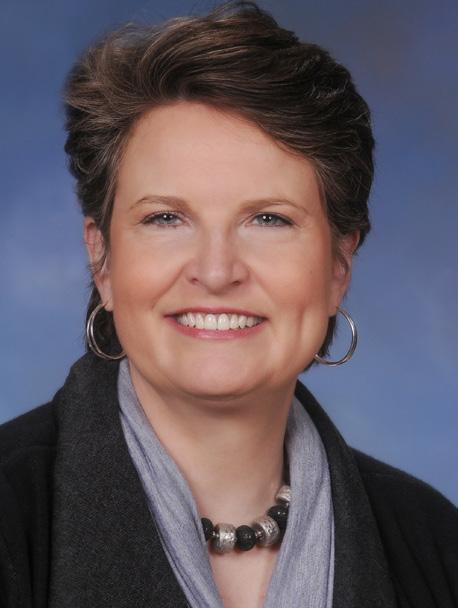
M. Gayle Corley is a University of Arkansas graduate who focuses her law practice on estate planning, elder law and probate.
Elder law attorneys routinely create estate plans for adults of all ages, and advise clients (typically those aged 65 or older or who have been diagnosed with an incurable condition) regarding how to pay for long-term care. A few people can afford to privately pay for care, and others have long-term care insurance. But about two-thirds of all Americans rely on Medicaid1 and/or the pension offered by the U.S. Department of Veterans Affairs (“VA”).2 While a basic VA pension exists, only the very poor qualify due to the very low limits on income. The VA offers two higher pensions—known as “Housebound” and “Aid and Attendance” (“A&A”).3 Many middleclass veterans in need of long-term care can qualify for the VA housebound or A&A pension because the rules pertaining to those allow one to deduct from income all out-of-pocket expenses incurred for medical care4 (which expenses typically exceed a retiree’s income once in a nursing home or assisted living facility). The practice of elder law requires understanding which assets count against benefit eligibility, and which do not. For almost every Medicaid or VA rule there are numerous exceptions.
Medicaid is different from Medicare. Everyone aged 65 or older who is eligible to receive Social Security is eligible to receive Medicare; it is not needs-based.5 Medicare will pay for a brief period of rehabilitation following an accident, stroke or illness; if the patient requires skilled care for a longer period, long-term care comes into play, and Medicare will not pay for that. Medicaid is a means-tested joint federal and state government-run health insurance program for people with extremely limited income and assets, but the long-term services and supports program pays for the majority of all Arkansas nursing home residents. Once a long-term care Medicaid application is approved, all income of the applicant, less health insurance premiums and a $40/month Personal Needs Allowance,6 is paid to the nursing home, and Medicaid pays the balance.7 Almost every nursing home in Arkansas accepts Medicaid. The Arkansas Department of Human Services (“DHS”) oversees Medicaid eligibility for Arkansas residents.
16 The Arkansas Lawyer www/arkbar.com
Whether applying for Medicaid or the VA pension with an A&A rating (which gets the highest VA pension amount), one must be eligible in three ways:
1. Require assistance with two or more “Activities of Daily Living” or “ADLs” such as bathing/grooming/ hygiene, dressing and undressing, toileting and ambulation (or, if the issue is dementia, require a protective environment);8
2. Have income below a prescribed limit; and
3. Own “countable” assets valued below a prescribed limit.
Medicaid
An applicant for Medicaid can have only $2,000 in “countable” resources.9 But certain assets are not “countable.” Noncountable assets include:10
• a home, with contiguous land, with equity up to $713,000, owned by the applicant (or the applicant’s spouse);11
• furnishings, household effects, clothing and jewelry of reasonable value;12
• a vehicle of reasonable value; and
• an irrevocable prepaid burial plan worth up to $15,000.13
All financial accounts, including retirement accounts, are countable,14 as is life insurance with a cash surrender value over $1,500.15 The spouse of the applicant may keep additional resources—all the couple’s resources equal to or less than $30,828,16 and a maximum equal to the lesser of $154,140 or one-half of all the couple’s countable resources.17
A Medicaid applicant’s monthly gross income cannot exceed an “income cap” of $2,829.18 But if it does, the applicant’s excess income can be assigned to a qualified income trust, more commonly known as a “Miller Trust,” and that solves the problem so long as the income does not exceed the applicant’s monthly cost of care.19 DHS counts only the applicant’s income; the applicant’s spouse can have unlimited income.20 The spouse’s income is considered only in that if it is below $2,465/month some of the applicant’s

income may be shifted to the spouse to allow the spouse to meet his or her monthly maintenance needs. Medicaid pays whatever nursing home costs the applicant’s income does not.
VA Pension
The VA Pension provides tax-free income to any “qualified veteran,” or surviving spouse of such veteran, who is eligible.21 No overseas deployment, combat duty or injury in the line of duty is required, nor does the medical condition being treated need to be related to the veteran’s military service.22
A “qualified veteran” is any individual age 65 or older, or permanently and totally disabled, or a patient in a nursing home receiving skilled nursing care, or receiving SSDI or SSI,23 if that individual (a) served at least 90 or more days of active duty military service (except a veteran who began service in or after 1980 must have served at least two continuous years), at least one day of which was during a wartime period,24 (b) received a discharge that was other than dishonorable,25 and (c) has a household “net worth” of no more than $155,356.26
Unlike Medicaid, the VA pension pays only a set amount, and only the veteran can file a claim while he or she is alive; after the veteran’s death his or
her surviving spouse can file.27 The most common 2024 VA pension benefits with the A&A rating are:28
• $27,609/year for a veteran with no dependent (unmarried);
• $32,729/year for a veteran married to a spouse who is not also a veteran; and
• $17,743/year for the surviving spouse of a veteran.
For a surviving spouse of a qualified veteran to be eligible for the VA pension, the spouse must have been married to the veteran for at least one year prior to the veteran’s death and, subject to narrow exceptions, must have lived with the veteran at the time of death and, subject to a very limited exception, never remarried.29
Unfortunately, the asset and income rules for the VA pension are confusingly like, but more complicated than, those for Medicaid. The value of a primary residence with land up to two acres (no matter the value),30 reasonable furnishings and household effects,31 and family transportation vehicles32 are not countable. But VA counts all other household assets and all household income—not just the claimant’s income.33 However, a claimant is to deduct from the household income
Vol. 59 No. 1/Winter 2024 The Arkansas Lawyer 17
all “unreimbursed medical expenses” (“UMEs”) incurred by the household;34 the difference is “Income for VA Purposes” (“IVAP”). VA then adds the household IVAP to the value of the countable household assets to get the claimant’s “net worth.” While the VA pension is more limited in amount, many veterans feel like it was earned and so prefer it to Medicaid. And it’s easier to qualify for than Medicaid when in an assisted living or memory care facility, or at home. The VA pension is deposited into the claimant’s checking account each month like Social Security, whereas Medicaid is paid directly to the nursing home. Unlike DHS, VA allows a claimant to pay a family member or friend to provide care and deduct the cost of that care as a UME.35
Gifts Made within the Look Back are Penalized
Both DHS and VA will penalize gifts made by the applicant/claimant or his or her spouse. DHS penalizes36 any gift made within five years before applying for Medicaid,37 and VA penalizes any gift made within three years before applying for the VA pension.38 These are referred to as “look back” periods. This is why elder law attorneys often recommend that clients create an irrevocable asset protection trust and transfer their assets to it; the transfer of assets to an irrevocable trust is considered a gift, but that gift is not penalized if made more than five years before applying for benefits (three years for VA pension).
DHS will even penalize a gift of an asset that would not be “countable” when determining Medicaid eligibility, such as a home with equity under the limit. The penalty for making a gift is ineligibility for benefits for a time. DHS calculates that penalty by dividing the value of the gift by a “Divestment Penalty Divisor”; the quotient is the number of months during which the applicant is not eligible. Currently, the DHS Divisor is $8,334.39 For example, if an applicant gave away property worth $250,000 and then applied for Medicaid, that applicant would be ineligible for Medicaid for 30 months. There is no limit on the length of the penalty period. Donations to a church or
other charities, if reasonable in amount and consistent with patterns of giving over many years, will typically not be penalized, but gifts to family members will be. If the recipient of the gift pays for the care of the applicant, that will create a partial “cure” of the gift and a concurrent shortening of the penalty period.
VA also calculates a gifting penalty by dividing the value of the gift by a divisor. But the VA divisor is smaller—so results in a longer penalty. The current VA divisor is $2,727;40 therefore, a $250,000 gift would result in a VA penalty of 91 months. However, VA will not impose a penalty longer than five years no matter the value of the gift.41
Estate Recovery
Most Medicaid applicants ask about “estate recovery”—DHS’s right to file a claim against the estate of a deceased person who received Medicaid.42 DHS is not to pursue estate recovery against a Medicaid recipient’s home if a surviving spouse, child under 21, or disabled child resides there, or if recovery will create an undue hardship for other surviving family members.43 The easiest way to avoid DHS estate recovery impacting a Medicaid recipient’s home is to convey the home to an adult child or other family member by Beneficiary Deed. Since a Beneficiary Deed does not take effect until the owner dies, it is not considered a lifetime gift subject to penalty. And a home conveyed by beneficiary deed is not subject to estate recovery.44
Conclusion
In sum, an elder law attorney must understand the Medicaid and VA pension rules, and the exceptions to those rules, and which assets are “countable” against benefit eligibility, and which are not. Any attorney should be aware that assets owned by a revocable trust will be “countable” in the eyes of DHS and the VA. And attorneys should ascertain whether a client wants the client’s agent under a power of attorney to be able to later create an irrevocable asset protection trust, as that requires that the power of attorney give the agent broad gifting authority.45
Endnotes:
1. The Medicaid rules applicable to the Long Term Services and Supports (“LTSS”) programs are different from others; this article addresses only LTSS programs for nursing home residents.
2. 39 U.S.C. § 1521; 38 C.F.R. § 3.3.
3. 38 U.S.C. § 1521(d), (e); 38 C.F.R. § 3.351.
4. 38 C.F.R. § 3.23 and § 3.278.
5. The Medicare and Medicaid Act of 1965, also known as the Health Insurance for the Aged and Disabled, Title XVIII of the Social Security Act, 42 U.S.C. §§ 1395-1395III; Arkansas Medical Services Policy Manual (hereinafter, the “MS Manual”), Section F-191.
6. Ark. Code Ann. § 20-77-127; MS Manual, Section H-410.3.
7. 42 C.F.R. § 435.725; Ark. Code Ann. § 20-77-102. Medicaid can help pay for home healthcare or care in an assisted living facility under certain waiver programs, but those programs are not covered by this article. Very few assisted living or memory care facilities, or home healthcare providers, accept Medicaid.
8. MS Manual, Sections F-150 to F-154.
9. MS Manual, Section B-311 and Section E-110.
10. 42 U.S.C. § 1382b.
11. MS Manual, Sections E-516 & H-203; MS Manual, Appendix R, for home equity limit. There is no equity limit if a spouse, child under 21 or disabled child resides there. Any asset owned by a revocable trust, including a home, is countable. MS Manual, Section H-304.2.
12. MS Manual, Section E-523 (also applies to vehicle).
13. MS Manual, Section E-523.5d.
14. MS Manual, Sections E-500 and E-520.
15. MS Manual, Section E-523.2.
16. Medicare Catastrophic Coverage Act of 1998 (P.L. 100-360); MS Manual, Sections H-203 and H-204. For 2024 figures, see the 2024 SSI and Spousal Impoverishment Standards published by Centers for Medicare & Medicaid Services. This and most dollar amounts contained in this article increase slightly each year, at various times of the year.
17. MS Manual, Section H-204.
18. 2024 SSI and Spousal Impoverishment Standards published by Centers for
18 The Arkansas Lawyer www/arkbar.com
Medicare & Medicaid Services.
19. 42 U.S.C. § 1396p(d)(4)(B); MS Manual, Sections H-110 to 116 & Section H-304.4.b.
20. MS Manual, Section E-440.
21. 38 U.S.C. § 101(2); 38 C.F.R. § 3.1(d).
22. 38 U.S.C. §§ 1502(a) & 1513; 38 C.F.R. § 3.3.
23. 38 U.S.C. §§ 1502 & 1513.
24. 38 U.S.C. § 1521(j); 38 C.F.R. §§ 3.2 & 3.3.
25. 38 U.S.C. § 5303; 38 C.F.R. § 3.12.
26. 38 U.S.C. §§ 1521 & 1522; Pub. L. 95-588 (92 Stat. 2497); 38 C.F.R. § 3.274 as to net worth; 38 C.F.R. § 3.2371 as to income; 38 C.F.R. § 3.23(D)(4) as to household income.
27. 38 U.S.C. § 1541; 38 C.F.R. § 3.23.
28. 38 U.S.C. § 1521 for veteran; 38 U.S.C. § 1541 for surviving spouse of veteran; 38 C.F.R. § 3.23 for veteran and spouse.
29. 38 C.F.R. § 3.50(b)(2).
30. 38 C.F.R. § 3.275(a)(3) and § 3.275(b)(1).
31. 38 C.F.R. § 3.275(b)(2).
32. 38 C.F.R. § 3.275(b)(2).
33. 38 U.S.C. § 501; 38 C.F.R. §§ 3.271, 3.23(d)(4), 3.23(d)(5), 3.24 and 3.275(a).
34. 38 U.S.C. § 501; 38 C.F.R. §§ 3.272 and 3.278. The UMEs must be reduced by a factor referred to as 5% of MAPR (38 C.F.R. § 3.272 (g)) but an explanation of that is beyond the scope of this article.
35. 38 C.F.R. § 3.278.
36. MS Manual, Section H-308.
37. 42 U.S.C. § 1396p; MS Manual, Section H-302.
38. 38 C.F.R. § 3.276.
39. MS Manual, Appendix R; 016.20.04002 Code Ark. R.; MS 3334.3 and 3336.10.
40. 38 U.S.C. § 1521 (d)(2); 38 C.F.R. § 3.276(e)(1).
41. 38 C.F.R. § 3.276(e).
42. MS Manual, Section H-600.
43. MS Manual, Section H-600.
44. Ark. Code Ann. § 20-76-436.
45. Ark. Code Ann. §§ 28-68-201 and 28-68-217. ■



Vol. 59 No. 1/Winter 2024 The Arkansas Lawyer 19
1-800-343-4218 Blair & Stroud Attorneys at Law in Batesville Welcomes New Lawyer
Blair
Stroud Law Firm as an attorney
with a
doctorate
the William H
School
was a member of the
competition
Bowen
work at the Delta Divorce
with a degree in
of Batesville, Kaitlin is focusing on the general practice of law
& Stroud is a firm formed in 1982 whose members are H David
Robert D Stroud, Barrett S Moore, and Kaitlin G Blakely www.blastlaw.com 1-800-343-4218 500 East Main St., Suite 201 Batesville, AR 72501
Kaitlin G Blakely has joined
&
She graduated Cum Laude
juris
in 2023 from
Bowen
of Law Kaitlin
Moot Court Board’s
team, a Dean’s Fellow, and a
Scholar Her experience includes
Clinic Before attending law school, Kaitlin graduated from Arkansas State University Magna Cum Laude
Philosophy A native
Blair
Blair,
“A Fine Line”
Strategies for Engaging in Succession Planning without Violating the ADEA
By Michelle Kaemmerling
As part of any strategic plan, a company essentially asks itself the customary interview question: Where do you see yourself in five years? How about 10 years? Built into that query is the question of who will be leading the organization in five years or 10 years, so succession planning at times requires talking to current key employees about their retirement plans. This situation seems to be occurring more frequently now that employees are retiring later. In 2022, a Gallup poll found that the average target retirement age is 66, up from 60 in 1995. While retirement-plan discussions are often a necessary part of a company’s strategic planning, they should be approached carefully in order to minimize the risk of age-discrimination claims.
As a backdrop to this discussion, it is worth noting that around 16% of all charges filed with the Equal Employment Opportunity Commission (“EEOC”) allege age discrimination, and the agency’s litigation division has been increasingly active. In the EEOC’s 2023 Year-End Litigation Roundup, the agency reported that it filed 50% more lawsuits in 2023 than in 2022.1 Of particular relevance to the present subject, the EEOC recently filed a nationwide age-discrimination lawsuit against a company that sought to address its aging workforce by implementing an “Early Career” hiring initiative to bring in more millennials.2 The company settled the lawsuit by agreeing to pay $2.4 million and provide other equitable relief.3

Age Cannot Be a Factor in Any Employment Decision
The Arkansas Civil Rights Act does not include age as a protected class, but federal law does. The Age Discrimination in Employment Act (“ADEA”) protects employees who are 40 or older from discrimination based on age and applies to companies with 20 or more employees. The law prevents covered employers from considering employees’ age in making any decisions about their employment. For example, in identifying employees who will be laid off, it would be improper for a company to select those who are closer to retirement age. The law also prohibits decision-making that has a disparate impact on older workers even if there was no discriminatory intent.
Retirement Planning Discussions Should Not Reference Age
Courts have recognized that employers have a legitimate business interest in knowing their employees’ plans for the future, but discussions should be age-neutral. Obviously, a conversation that starts, “You’re getting on up there, how much longer do you think you want to do this?” is more likely to be perceived as pressuring the employee to retire, or even harassing the employee, than one that approaches the issue without reference to age. When companies initiate discussions about retirement plans or succession planning, it is best to avoid any reference to age (or to proxies for age such as “boomers” or “your generation”). The better practice is to approach the discussion in terms of the employee’s career plans and goals and to try to have such discussions with all employees in similar positions regardless of age.
20 The Arkansas Lawyer www/arkbar.com
Michelle Kaemmerling is a partner at Wright
Lindsey Jennings LLP in Little Rock. She is a member of the firm’s labor and employment team.
Bevan v. Honeywell, Inc.4 is instructive on how not to approach succession planning. In that case, evidence showed that a newly-hired company executive initiated a “revitalization campaign” that included evaluation of the staff to identify talented individuals who could fill management roles when needed in the future. Evidence presented at trial included a memo from the human resources department stating “that age would be a major consideration in the talent review process” and instructed department heads to “‘focus on your younger, promising talents (in the 35 year old range or younger).’”5 There was also evidence that a human resources director told the plaintiff that it was “‘getting tough to fit the old farts’” into the new organization.6 The plaintiff prevailed at trial, and the verdict was for the most part affirmed on appeal.
There are other examples of careless remarks about age creating significant legal risks. For example, a company recently agreed to pay almost $400,000 to settle an age-discrimination lawsuit filed by the EEOC on behalf of two former employees who claimed they had been subjected to inappropriate age-related comments, including “that they were too old to relate to millennial customers, that they were too set in their ways, that they were too old to do their jobs, and addressed them as Waldorf and Statler (the older Muppets from the balcony).”7
Repeatedly asking an employee about retirement or encouraging them to retire may also be offered as evidence of age discrimination. The EEOC has recently pursued multiple age-discrimination lawsuits involving allegations that employers pressured employees to retire, including one in which management was alleged to have continuously asked an employee “when are you going to retire;” “why don’t you retire at 65;” and “what is the reason you’re not retiring?”8 So, if an employee is approached about her retirement plans and indicates that she has no plans to retire, the company needs to accept the answer and move on— no means no, as it were.
Avoid Making Assumptions
Courts have recognized that avoiding age discrimination claims can present

unique challenges for companies because unlike sex or race discrimination, age often correlates with legitimate employer concerns.9 A consideration that correlates with age is not prohibited unless the stereotype prohibited by the ADEA, the notion “that older individuals [are] less productive or competent,” is implicated by the consideration.10 In a decision following a bench trial of a failure-to-hire agediscrimination case, United States District Judge Thomas Eisele observed: “Age, unlike sex or race, is frequently correlated with legitimate employer concerns such as the impact on an organization of an aging workforce. And so the difficult question arises: how does an employer walk the fine line between legitimate employer concerns and age discrimination. Or, stated otherwise, which age-related factors should it be safe to consider in making employment decisions?”11
When having succession-planning discussions, companies should avoid making assumptions. For example, employers should not assume that an employee will retire at a certain age. The EEOC recently filed a lawsuit against a business that allegedly assumed employees would retire once they turned 65 and purportedly questioned and terminated the employees who refused to do so.12
Companies should also avoid making assumptions about employees’ longevity based on age-related stereotypes. One court found that an employer “used potential longevity with the company as a proxy for age” in violation of the ADEA when
the company’s plan “was to hire or retain younger workers at the expense of older workers because it was more likely that the former would stay with the company longer than the latter.”13
Severance Packages and Valid Waivers of Age Claims
Companies may offer a severance package conditioned on a full release of claims in conjunction with an employee’s retirement or early retirement, though such conversations must be handled carefully for the reasons discussed above. In order to obtain an enforceable release of claims under the ADEA, a company must follow the requirements of the Older Workers Benefits Protection Act. That Act generally requires, among other things, that the employee be given 21 days to consider the release and seven days to revoke the release after signing. And if a layoff or exit incentive affects more than one employee, employees who are 40 years of age and older must be given at least 45 days to review the release agreement, and the company must disclose the job positions and ages of all the employees in each of the impacted decisional units and specify who was and was not selected for layoff.
In conclusion, while there are some potential pitfalls when engaging in succession planning, with careful planning and a full understanding of the legal issues at play, companies can have the conversations necessary to plan for the future without opening themselves up to legal risks.
Vol. 59 No. 1/Winter 2024 The Arkansas Lawyer 21




22 The Arkansas Lawyer www/arkbar.com BReporting@gmail.com 501-554-6699 Cris M. Brasuell, CCR ArkansasCourtReporter.com For All Your Transcription and Court Reporting Needs
Endnotes:
1. https://www.eeoc.gov/newsroom/eeocannounced-year-end-litigation-round-fiscalyear-2023.
2. Lilly USA Sued by EEOC for Nationwide Age Discrimination, U.S. Equal Employment Opportunity Commission (Sept. 26, 2022), https://www.eeoc.gov/ newsroom/lilly-usa-sued-eeoc-nationwideage-discrimination.
3. Lilly USA Agreed to Pay $2.4 Million to Settle Nationwide EEOC Age Discrimination Lawsuit, U.S. Equal Employment Opportunity Commission (Oct. 11, 2023), https://www.eeoc.gov/newsroom/ lilly-pay-24-million-settle-nationwide-eeocage-discrimination-lawsuit.
4. 118 F.3d 603 (8th Cir. 1997).
5. Id. at 610.
6. Id.
7. Davis Automotive Group/BMW Cleveland to Pay $390,000 to Settle EEOC Age Discrimination Suit, U.S. Equal Employment Opportunity Commission (Dec. 20, 2021), https://www.eeoc.gov/ newsroom/davis-automotive-group-bmwcleveland-pay-390000-settle-eeoc-agediscrimination-suit; Compl. § 24, EEOC v. Davis Auto. Grp., Inc., No. 1:19CV02257, 2019 WL 13115901 (N.D. Ohio Sept. 27, 2019).
8. J&M Industries Sued by EEOC for Age Discrimination, U.S. Equal Employment Opportunity Commission (Mar. 31, 2023), https://www.eeoc.gov/newsroom/ jm-industries-sued-eeoc-age-discrimination; EEOC v. Burrow Global Servs. LLC, No. 4:20CV00423, 2021 WL 1811840 (S.D. Tex. Feb. 7, 2020); Davis Automotive Group/ BMW Cleveland to pay $390,000 to Settle, supra note 7.
9. Johnson v. Harvey, No. 4-05-CV-01773, 2007 WL 201225, at *2 (E.D. Ark. Jan. 24, 2007).
10. Schiltz v. Burlington N. R.R., 115 F.3d 1407, 1412 (8th Cir. 1997) (citing Hazen Paper Co. v. Biggins, 507 U.S. 604, 113 S. Ct. 1701 (1993)).
11. Johnson, 2007 WL 201225, at* 2.
12. See, e.g., J&M Industries sued by EEOC for Age Discrimination, supra note 8.
13. Sharp v. Aker Plant Servs. Grp., Inc., 726 F.3d 789, 801 (6th Cir. 2013). ■


Vol. 59 No. 1/Winter 2024 The Arkansas Lawyer 23
Landex Research, Inc. PROBATE RESEARCH Missing and Unknown Heirs Located No Expense to the Estate Domestic and International Service for: Courts Lawyers Trust Officers Administrators/Executors 1345 Wiley Road Suite 121, Schaumburg, IL 60173 Telephone: 800-844-6778 Fax: 800-946-6990 www landexresearch com

Preferred IOLTA Banks support justice for all IOLTA interest funds legal aid for the unhoused, survivors of abuse, and other Arkansans in need Learn more at arkansasjustice org/IOLTA












































24 The Arkansas Lawyer www/arkbar.com


Vol. 59 No. 1/Winter 2024 The Arkansas Lawyer 25 Handling all your briefing needs Robert S. Tschiemer Ark. Bar 84148 P.O. Box 549 Mayflower, AR 72106 501.951.3303 (p) 501.377.9866 (f) Tschiemer Legal Briefing From the ordinary to the most complex, no appeal is too small or large For a complete listing of decisions see www.tschiemerlegalbriefing.com Offering quality, consistency and reasonable prices for all of your briefing needs. Writing Briefs to the Arkansas Court of Appeals, the Arkansas Supreme Court, the Federal Circuits and the U.S. Supreme Court Robert Tschiemer is the author of the Arkansas Bar Association Weekly Case Summaries available at www.arkbar.com robert@tschiemerlegalbriefing.com www.tschiemerlegalbriefing.com
By Frank LaPorte-Jenner
Guardianships for the Elderly

Frank is a managing partner of LaPorteJenner Law, PLLC, a family focused firm that he founded with his wife Kelli.
Conversations about retirement and estate planning tend to focus almost exclusively on financial considerations. This is understandable; the ability to retire is first and foremost a question of financial means. And after we spend our lives working to generate wealth, we want to ensure it passes to our loved ones without issue. Similarly, attorneys expend a great deal of time and energy on estate plans that minimize the administrative and financial burden on the heirs. But some aspects of our future are beyond our control, and our plans need to also consider what happens if we are no longer physically or mentally able to take care of ourselves.
Just like probate, if a person loses capacity and no formal plans are put into place, the law empowers a court to create a plan and put it into effect. But we would almost always advise our clients to have a will or trust in place, and we should consider doing the same with powers of attorney. A well-crafted power of attorney can provide the agent with all the same powers of a guardianship, and could negate the necessity of a formal guardianship proceeding altogether. Moreover, there are several provisions in the Arkansas guardianship statutes that encourage less invasive solutions than a court-ordered guardianship.
Arkansas law makes it clear that guardianship for an incapacitated person shall be used only as is necessary to promote and protect the well-being of the person and his or her property.1 Further, if the Court finds that alternatives to guardianship are feasible and adequate to meet the needs of the proposed ward, the court may dismiss the action.2 Even if a court does find that a proposed ward is incapacitated, the court is required to determine the extent of the incapacity and the feasibility of less restrictive alternatives to guardianship.3 This is where a power of attorney could be used to avoid a guardianship if it is done as part of your estate planning process.
In Arkansas, there are two provisions that govern powers of attorney. The first type is a health care power of attorney found in the Arkansas Healthcare Decisions Act.4 Under that provision, an individual may execute a durable power of attorney for health care that authorizes an agent to make healthcare decisions that the principal could make if he or she had capacity.5 The durable power of attorney can remain in effect if the principal loses capacity, allowing the agent to make healthcare decisions for the principal once the principal is no longer able to do so.6 Notably, a “durable” power of attorney just means that the power of attorney is not terminated if and when the principal becomes incapacitated.7
The second set of provisions for powers of attorney are financial powers of attorney, found in the Uniform Power of Attorney Act.8 This chapter focuses on powers granted over the principal’s estate, and makes clear that the Uniform Act excludes delegations of authority to make healthcare decisions.9 The Uniform Act provides a statutory form power of attorney, outlining the powers and limitations a person may grant under the Act.10 The power of attorney may even nominate a guardian for the principal, but that guardianship is not effective until a court appoints the guardian.11
26 The Arkansas Lawyer www/arkbar.com
One of the biggest determining factors in whether you can utilize a power of attorney, or will have to formally pursue a guardianship, is whether the proposed ward has capacity. In Arkansas, an incapacitated person is a person who is impaired by reason of a disability such as mental illness, mental deficiency, physical illness, chronic use of drugs, or chronic intoxication, to the extent of lacking sufficient understanding or capacity to make or communicate decisions to meet the essential requirements for his or her health or safety or to manage his or her estate.12 If the person you are assisting has the requisite capacity to execute a power of attorney, he or she can do so. If, however, the person lacks the necessary capacity to execute a power of attorney, you’ll have to seek a formal guardianship order. Determining whether a person has the requisite capacity to execute a power of attorney isn’t an exact science, but we fortunately have assistance from the law of contracts.
A principal must possess contractual capacity in order to execute a valid power of attorney.13 There is a presumption in the law that every person is sane, fully competent, and capable of understanding the nature and effect of her contracts.14 A party seeking to establish incompetency must do so by a preponderance of the evidence.15 In the case of Lillian H. Ashton Trust v. Caraway, the Arkansas Court of Appeals had the opportunity to review contractual competency.16 In that case, the Court of Appeals was asked to review whether Mrs. Lillian Brooks lacked capacity when entering into a real estate contract to sell a piece of property she owned in Izard County.17 Mrs. Brooks originally agreed to sell the property, but later attempted to rescind the contract.18 Mrs. Brooks executed a power of attorney for her son, and the son alleged that Mrs. Brooks lacked capacity at the time she entered into the sale contract.19 A lawsuit was then filed against Mrs. Brooks for specific performance on the contract, and the trial court ultimately determined that she failed to meet her burden to prove that she lacked the mental capacity to enter into the contract.20
On appeal, the Arkansas Court of Appeals reviewed the sufficiency of the evidence regarding Mrs. Brooks’ capacity at the time

she executed the sale contract.21 Testimony offered at trial indicated that Mrs. Brooks was 86 years old when she signed the contract, suffered from Alzheimer’s disease, and was taking pain medication.22 In spite of this, the trial court found that Mrs. Brooks did not meet her burden of proof to demonstrate incompetence.23 The trial court noted that none of the testimony provided by Mrs. Brooks spoke to her exact mental capacity or state of mind at the time she signed the contract.24 Additionally, it looked at other circumstances around the sale itself, such as that she had authored and drafted a well-written power of attorney for her son, and that “in order to be able to even contemplate documents of this nature, her mental abilities had to be such that she was aware of the contract, that she had signed the contract, and that she owned land in Arkansas that the contract purported to sell.”25 The Arkansas Court of Appeals, in turn, held that “[g]iving due deference to the trial judge’s superior position to determine the credibility of witnesses and the weight to be accorded to their testimony, we hold the circuit court did not clearly err in finding that appellants failed to prove Mrs. Brooks was unable, because she lacked the mental capacity, to enter into a valid and enforceable contract at the time she signed the Offer and Acceptance.”26
As Lillian H. Ashton Trust v. Caraway
illustrates, determining capacity at the time of executing a contract or power of attorney isn’t a straightforward endeavor. If, however, you are working with an individual who lacks capacity altogether, you will have to seek an order for guardianship.
In Arkansas a guardian is a person appointed by a court to have the care and custody of the person or of the estate, or of both, of an incapacitated person.27 It is important to remember that a guardianship must be appointed by a court;28 many times wills or powers of attorney will nominate a guardian, but those appointments do not take effect until a court formally appoints a guardian. For a person to be named as a guardian, he or she must meet the qualifications laid out in Ark. Code Ann. § 28-65-203. Once you determine that your client meets the necessary qualifications to serve as a guardian, you must file a petition to request your client be appointed as guardian.29
Looking to the guardianship petition itself, your initial petition should include the information required by Ark. Code Ann. § 28-65-205. When filing your petition, you must provide notice to all parties listed in Ark. Code Ann. § 28-65207, including the alleged incapacitated person. The alleged incapacitated person cannot waive notice.30 You also must apprise the proposed ward of his or her rights
Vol. 59 No. 1/Winter 2024 The Arkansas Lawyer 27
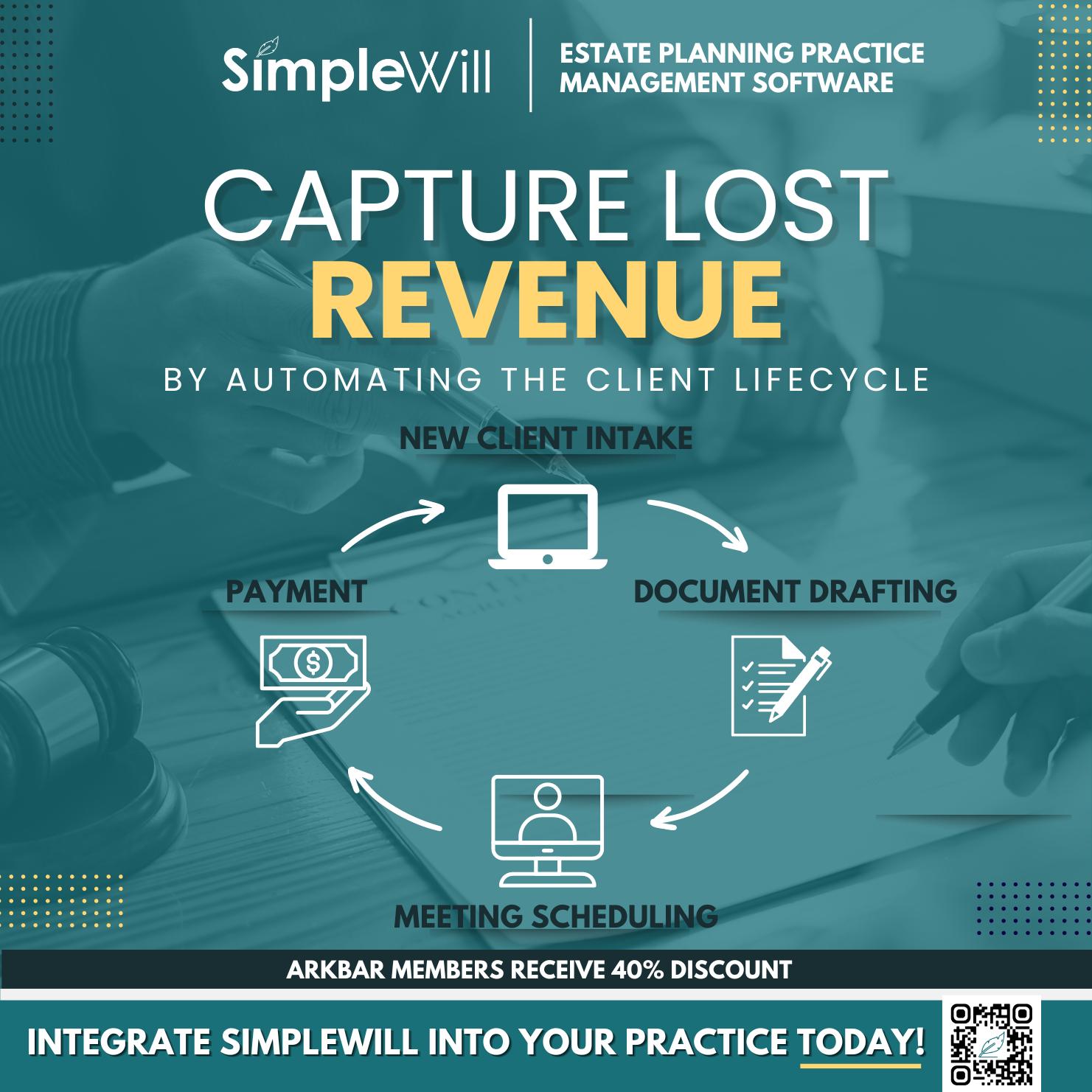
outlined in Ark. Code Ann. § 28-65-21331 and Ark. Code Ann. § 28-65-106.
If you believe you need to pursue an emergency order for guardianship, you should review the specific provisions of Ark. Code Ann. § 28-65-218. You can request an ex parte guardianship through either a verified petition or through a motion that is accompanied by an affidavit.32 To receive an ex parte order for guardianship, your filings must demonstrate specific facts of imminent danger to the life or health of the incapacitated person, or show loss, damage, or waste of the property of the person’s estate, and that this harm necessitates the immediate appointment of a guardian.33
Before a court can grant a final order of guardianship, a hearing must be held at which the proposed ward has a right to be present and represented by counsel.34 In establishing that a person lacks capacity, a court must be provided with either oral testimony or a sworn statement of one or more qualified professionals, whose qualifications shall be set forth in their testimony or written statements.35 If the alleged incapacitated person is currently
in a hospital or medical facility, you must provide oral testimony or a sworn statement from a medical professional employed by that hospital or facility.36
A common practice is to request temporary guardianship while the case proceeds. The benefit of temporary guardianship is that it will allow your client to act in the capacity as guardian while the case is pending before the court. Getting the evidence of incapacity from a qualified medical professional as required by Ark. Code Ann. § 28-65-211 could take some time, so a temporary guardianship will allow your client to begin assisting the proposed ward sooner rather than later. A hearing will still be required to grant a temporary guardianship, unless there is a written agreement between the necessary parties.37 Once a hearing is conducted, a court may enter an order granting a temporary guardianship for a period of up to 90 days from the date of the emergency hearing.38 Guardianship, like any formal court proceeding, can be time consuming and expensive. We can help our clients avoid this process, however, if we help them plan
for their physical care when considering their future. I believe attorneys should put the same focus on avoiding the guardianship process as we do on avoiding the probate process. This way, we can help ensure our clients and their families don’t have to struggle through the court system when they may already be going through difficult circumstances.
Endnotes:
1. Ark. Code Ann. § 28-65-105.
2. Id. § 213(c)(2).
3. Id. § 213(c)(1).
4. Ark. Code Ann. § 20-6-103.
5. Id. § 103(b)(1).
6. Id. § 103(b)(3).
7. Ark. Code Ann. § 28-68-102.
8. Ark. Code Ann. §§ 28-68-101–405.
9. Ark. Code Ann. § 28-68-103(2).
10. Id. § 301.
11. Id. § 108(a).
12. Ark. Code Ann. § 28-65-101.
13. 2A C.J.S. Agency § 27.
14. Lillian H. Ashton Trust v. Caraway, 2009 Ark. App. 806, at 7, 370 S.W.3d 278, 282.
15. Union Nat'l Bank of Little Rock v. Smith, 240 Ark. 354, 356, 400 S.W.2d 652, 653 (1966).
16. 2009 Ark. App. 806, at 7, 370 S.W.3d at 282.
17. Id. at 1–2, 370 S.W.3d at 279.
18. Id.
19. Id.
20. Id.
21. Id.
22. Id.
23. Id.
24. Id.
25. Id. at 7.
26. Id. at 7-8.
27. Ark. Code Ann. § 28-65-101(3).
28. Id.
29. Id. § 205.
30. Id.
31. Id. § 207.
32. Id. § 218(a)(1)(A).
33. Id.
34. Id. § 213(a).
35. Id. § 211(b)(1).
36. Id. § 211(b)(2).
37. Ark. Code Ann. § 28-65-218(a)(1)(c).
38. Id. ■
28 The Arkansas Lawyer www/arkbar.com






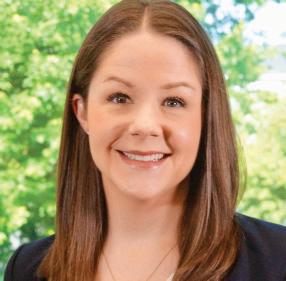


Vol. 59 No. 1/Winter 2024 The Arkansas Lawyer 29 Love Justice? So have we since 1953. mcmathlaw.com | 501.396.5400 Samuel E. Ledbetter Will Bond Carter C. Stein Charles D. Harrison Neil Chamberlin Sarah C. Jewell Tim Giattina Personal Attention, Proven Results Since 1953 | 711 W. 3rd Street, Little Rock, AR 72201 | 525 S. School Avenue, Fayetteville, AR 72701
By Caleb D. Hollinger
Undue Influence and the Aged
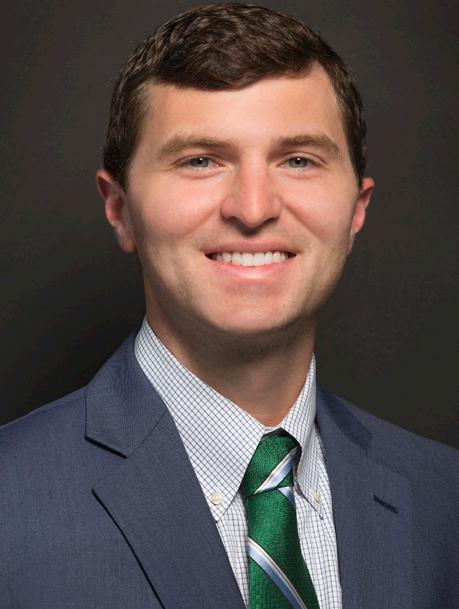
Caleb D. Hollinger is an associate at Friday, Eldredge & Clark LLP in Little Rock. He is a member of the firm’s Trust and Estate Planning Group.
Undue influence is a doctrine that many lawyers study while in law school, yet it is a doctrine that is challenging to identify absent facts demonstrating the textbook case. As stated by the Arkansas Supreme Court, undue influence
is generally exercised in secret, not openly, and, like a snake crawling upon a rock, it leaves no track behind it, but its sinister and insidious effect must be determined from facts and circumstances surrounding the testator, his physical and mental condition as shown by the evidence, and the opportunity of the beneficiary of the influenced bequest to mold the mind of the testator to suit his or her purposes.1
This article provides a refresher on the doctrine of undue influence in Arkansas and recommends best practices to prevent a will contest on the grounds that the testator’s actions were the product of undue influence. While questions of undue influence and testamentary capacity are inherently interrelated, and courts tend to consider the issues together,2 the focus of this article is on the question of undue influence.
I. The Doctrine of Undue Influence
Undue influence may be best described as a process, as opposed to merely an event, that often occurs behind closed doors. At common law, a donative transfer was procured by undue influence if the wrongdoer exerted such influence over the donor that it overcame the donor’s free will and caused the donor to make a donative transfer that the donor would not otherwise have made.3 While a few state legislatures have codified the doctrine of undue influence,4 the Arkansas General Assembly has not. Under Arkansas law, undue influence is not the influence that springs from natural affection; rather, it results from fear, coercion, or any other cause that deprives the testator of his or her free agency in the disposition of his or her property, and it must be specially directed toward the object of
30 The Arkansas Lawyer www/arkbar.com
procuring a will in favor of particular parties.5 While the issue of undue influence typically arises in the context of the execution of wills, the issue is frequently raised in the execution of inter vivos gifts and the creation of trusts.6 For purposes of this article, the term testator should be considered synonymous with grantor or donor.
Proving undue influence is an onerous task. To prove undue influence under Arkansas law, the moving party bears the burden of proving, by a preponderance of the evidence, that an influence was exercised over the donor such that it overcame the donor’s free will and caused the donor to make a donative transfer that he or she would not otherwise have made due to fear, fraud or overreach.7 Undue influence may be inferred from the facts and circumstances of a case, and cases involving questions of undue influence will frequently depend upon witness credibility.8 In recognition of the difficulties of proving undue influence, Arkansas case law has developed two threshold determinations that, if proved, will shift the burden of proof from the contestant to the proponent of the will.9 One such circumstance is the existence of a confidential relationship between the testator and the proponent of a will.
A. Confidential Relationship
A rebuttable presumption of undue influence arises where a confidential relationship is present between the testator and the proponent of a will,10 and the proponent bears the burden of rebutting the presumption of undue influence by a preponderance of the evidence.11 Despite the rebuttable presumption of undue influence that arises when a confidential relationship is present, the ultimate burden of proof remains with the contesting party.12 Arkansas law recognizes two types of confidential relationships that will give rise to a presumption of undue influence. One such confidential relationship is the existence of a legal relationship between the testator and the beneficiary that results in the beneficiary having legal control over the testator. The mere fact that a beneficiary held power of attorney over the testator was sufficient to

establish a confidential relationship giving rise to a presumption of undue influence.13 Similarly, a presumption of undue influence arose where a ward’s will named his guardian as a principal beneficiary.14
In addition to the existence of a legal relationship between the testator and the proponent of the will, Arkansas law is clear that a confidential relationship will give rise to a presumption of undue influence where there is a strong relationship of dependence or confidence between the testator and the beneficiary, especially confidence which springs from affection on one side and trust in reciprocal affection on the other.15 Arkansas case law suggests that such a confidential relationship does not exist merely because the parties are related. The influence of children over parents is legitimate so long as they do not extend a positive dictation and control over the mind of the testator.16 Courts have found a relationship of dependence or confidence giving rise to a presumption of undue influence between the testator and his spouse;17 the testator and her minister;18 and the donor and close friends who had attended to the donor’s needs, abandoned their way of life and subjected their time and attention to the donor’s wishes, and were the donor’s willing, pleasant and obedient companions.19
B. Doctrine of Procurement
Related and subsidiary to the doctrine of undue influence is the doctrine of procurement. The doctrine of procurement is the second threshold determination that will shift the burden of proving that the testator’s will was free from undue influence from the contestant to the proponent. If a beneficiary under a will engages in drafting or procuring the will, then a rebuttable presumption of undue influence arises and creates a burden for the beneficiary to prove beyond a reasonable doubt that the testator had both the testamentary capacity as well as the freedom from undue influence to execute a valid will.20 It is important to note that the beyond-a-reasonable-doubt standard that applies under an undue influence analysis where procurement is alleged is a substantially higher standard than the preponderance-of-the-evidence standard that applies in cases where a confidential relationship is present.
In a recent case, Peek v. Diley, 21 the trial court found that the grantee under a warranty deed had procured a deed where (i) the grantee and her husband lived with the grantor, (ii) the grantee and her husband made the grantor’s appointment with the attorney for purposes of preparing the deed, and (iii) the grantee drove the grantor to the appointment.22 However,
Vol. 59 No. 1/Winter 2024 The Arkansas Lawyer 31
the Sebastian County Circuit Court went on to rule, and the Arkansas Court of Appeals affirmed, that the grantee proved beyond a reasonable doubt that the grantor executed the deed free from undue influence.23 The Arkansas Court of Appeals found that the evidence supported the circuit court’s finding that the grantor exercised her own free will when she executed the deed.24 The proponent did not participate in the grantor’s meeting with the drafting attorney and was not privy to the discussions that occurred in that meeting. Moreover, the grantor’s decision to execute a warranty deed in favor of the proponent was consistent with the grantor’s prior estate plan in that the grantor had previously filed a beneficiary deed that would transfer the property to the proponent upon the grantor’s death.25
II. Avoiding Undue Influence
When it comes to avoiding an argument of undue influence, competency is key. Where the mind of the testator is strong and alert, facts constituting undue influence would be required to be far stronger than a case in which the mind of the testator was impaired by disease or advancing age.26 Practitioners should first evaluate the mental condition of their clients to assess their client’s vulnerability to undue influence. This can be accomplished by questioning the client about the nature and extent of their property and the implications of their dispositive wishes—questions that are typically asked when determining whether your client has testamentary capacity.
Practitioners should also be wary of allowing beneficiaries to be present during client meetings. The mere fact that a beneficiary is present while a will is made does not give rise to a presumption of undue influence.27 However, the presence of a beneficiary may pressure the client into making decisions he or she would not have otherwise made in the absence of such beneficiary.
Practitioners should also consider whether the changes requested by their client are consistent with their existing estate planning documents. Does the client wish to leave a large portion of their estate to someone who is unrelated to the
client or had little to no involvement with the client for the majority of their lifetime? A drastic change in the client’s estate plan might warrant some further investigation into whether the client has been unduly influenced by another. It is also a good idea for practitioners to have their client explain or document the reasons why he or she wishes to exclude a potential heir under his or her estate plan.
Finally, it is important to note that not all influence is undue influence. It is not hard to imagine a situation where the testator’s son acts as her primary caregiver during the years leading up to her death. In recognition of the love and affection shown by her son, the testator devises and bequeaths to her son a larger share of her estate than the son would have otherwise received under Arkansas law. In such a scenario, it cannot be said that the son’s influence over the testator was so insidious that the son overcame the testator’s free will. However, the result would be markedly different if the son was using his mother’s funds for his personal use under a power of attorney, limiting his mother’s access to medication, and shutting off his mother to interaction with others. In summation, undue influence can be difficult to spot. Undue influence is broader than one person’s influence on another. It encompasses the manipulation by a person in a position of power over another, thereby restricting his or her capacity to exercise free will.
Endnotes:
1. Hyatt v. Wroten, 184 Ark. 847, 853, 43 S.W.2d 726, 728 (1931).
2. Gustin v. Trotter (In re Estate of Jelinek), 2018 Ark. App. 618, at 7, 566 S.W.3d 156, 160.
3. Restatement (Third) Property: Wills and Other Donative Transfers § 8.3.
4. See, e.g., Cal. Welf. & Inst. Code § 15610.70 (Deering 2023); Me. Rev. Stat. tit. 33, § 1022 (2023); La. Civ. Code Ann. art. 1479 (2023).
5. Carpenter v. Patterson, 2023 Ark. App. 551, at 10, 2023 Ark. App. Lexis 573, at *13, 2023 WL8246824, at *5.
6. See Harbur v. O’Neal, 2014 Ark. App. 119, 432 S.W.3d 651 (involving undue
influence in the context of amendments to a revocable trust); Bennett v. Ballow, 2022 Ark. App. 311, 653 S.W.3d 357 (involving undue influence in the context of an inter vivos gift of real property).
7. Beavers v. Williams, 2015 Ark. App. 140, at 4, 2015 Ark. App. LEXIS 180, at *5-6, 2015 WL 1000295, at *2.
8. Carpenter, 2023 Ark. App. 551, at 10.
9. 4 Arkansas Probate & Estate Admin. § 2:7.
10. Carpenter, 2023 Ark. App. 551, at 8.
11. Union Nat'l Bank v. Leigh, 256 Ark. 531, 532, 509 S.W.2d 539, 540 (1974).
12. Carpenter, 2023 Ark. App. 551, at 8.
13. Haverstick v. Haverstick (In re Estate of Haverstick), 2021 Ark. 233, at 6, 635 S.W.3d 482, 486.
14. Birch v. Coleman, 15 Ark. App. 215, 691 S.W.2d 875 (1985).
15. Wesley v. Estate of Bosley, 81 Ark. App. 468, 475, 105 S.W.3d 389, 394 (2003).
16. Pyle v. Sayers, 344 Ark. 354, 361, 39 S.W.3d 774, 779 (2001).
17. Haverstick, 2021 Ark. 233, at 6, 635 S.W.3d at 486.
18. Gingrich v. Bradley, 232 Ark. 884, 888, 341 S.W.2d 33, 35 (1960).
19. Burns v. Lucich, 6 Ark. App. 37, 50, 638 S.W.2d 263, 270 (1982).
20. Pyle, 344 Ark. at 39, S.W.3d at 778.
21. 2023 Ark. App. 576.
22. Id. at 4.
23. Id. at 6.
24. Id.
25. Id. at 2.
26. Gustin, 2018 Ark. App. 618, at 7, 566 S.W.3d at 160.
27. Rose v. Dunn, 284 Ark. 42, 45, 679 S.W.2d 180, 182 (1984). ■
32 The Arkansas Lawyer www/arkbar.com

Vol. 59 No. 1/Winter 2024 The Arkansas Lawyer 33
Fastcase's Cert now includes New York, Texas, Nevada and Washington
Cert, a cutting-edge negative citator tool for Fastcase, empowers legal researchers by swiftly and effortlessly identifying cases that have been treated unfavorably in subsequent decisions, thus providing a comprehensive perspective on a case's precedential value.
Since launching Cert in 2023, the vLex and Fastcase teams have been rolling out this new feature to work on documents from different




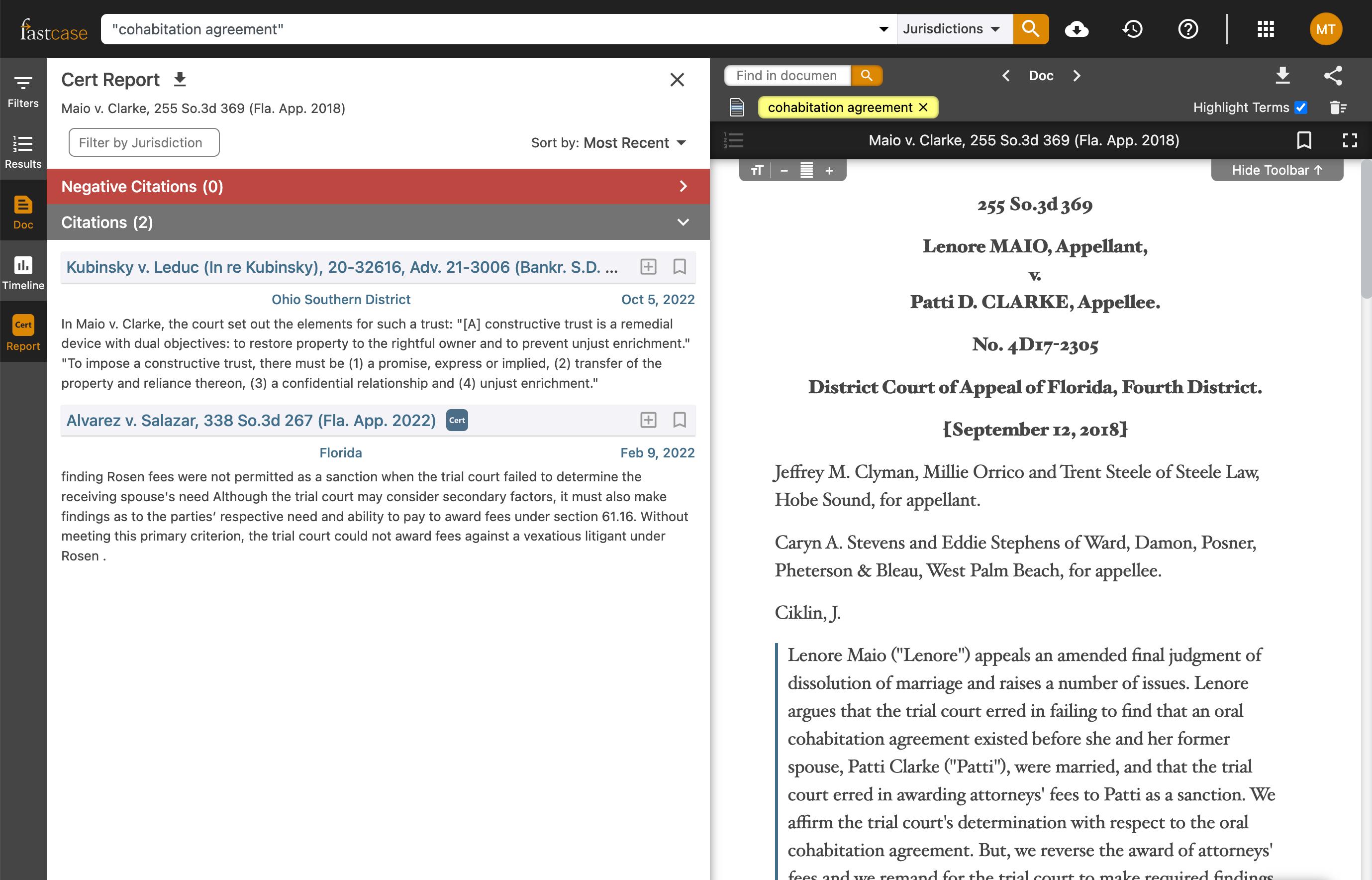
Learn more at vlex.com/fastcase
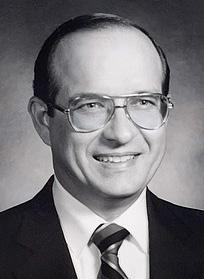
Judge Charles (Charlie) Wayne Baker died on December 21, 2023, at the age of 83. He attended the University of Missouri in Columbia, where he earned a law degree. During law school, Charlie was on Law Review, the Dean's list, and graduated 10th in his class. In 1965, Charlie and Nancy moved to Kansas City, Mo., where Charlie joined his first private law firm. To be closer to family, Charlie and Nancy relocated to Little Rock, Ark., in 1968, where Charlie's professional law career prospered over the next five decades. Charlie served as a federal bankruptcy judge from 1973 through 1984. When he was appointed at age 32, he was the youngest in the nation to hold that position. In 1984, Charlie joined the Rose Law Firm. He retired at age 60 in 2000.

Silas H. Brewer, Jr., of Walton, Ky., died on October 24, 2023, at the age of 90. Silas graduated from Duke University and then entered law school at the University of Kentucky, where he graduated in 1964. Silas proudly joined the United States Marine Corps upon graduation from college, where he served on Okinawa in a Rifle Regiment as an Infantry Platoon Leader. He later served in the Marine Reserves as a Company Commander and retired early as a Captain. Silas practiced law in Little Rock for over 35 years at Kaplan Brewer and Maxey Law firm, where he remained until retirement.

Thomas Baytop Fitzhugh, Jr., of Augusta died on October 20, 2023. Bay, as he was known to everyone, graduated from Columbia Military Academy and received his undergraduate degree from Vanderbilt University in Nashville, Tennessee. He earned an MBA from Columbia University in New
York. Several years later he earned a JD from the University of Arkansas Law School. For many years, Bay served as Augusta City Attorney and as a member of the Augusta School Board.

John Robert Irwin of Morrilton died on December 21, 2023, at the age of 65. John graduated from Russellville High School in 1976 and joined the United States Navy that summer. While in the Navy he served on the U.S.S. Kitty Hawk and the U.S.S. Tarawa. He graduated from Arkansas Tech University, followed by a juris doctor from the University of Arkansas School of Law in 1995. He was licensed to practice law later that year and practiced until his death.

Faye Reed of Helena died on October 28, 2023, at the age of 68. Ms. Reed was an attorney for a number of years, and she was also a member of the Zeta Phi Beta Sorority.
Stewart Lambert of Cherokee Village died on January 14, 2024, at the age of 69. After graduating from law school, Stewart became a trial attorney, served as deputy prosecutor, and was elected to the position of prosecuting attorney.

Amanda Mankin Mitchell died on December 27, 2023, at the age of 51. Amanda graduated from the University of Central Arkansas. After graduating from the William H. Bowen School of Law in 1996, Amanda went to work for Pulaski County where she used her many skills, both born with and learned, to serve the public in numerous positions.
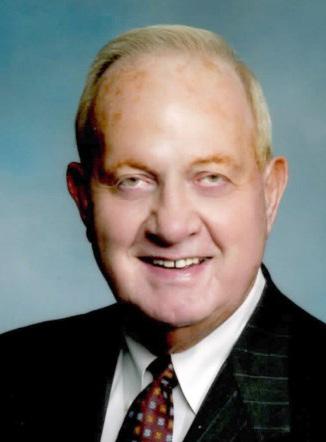
James "Red" Morgan of Searcy died February 1, 2024, at the age of 90. Red practiced law in his hometown of Searcy from 1966 until 2018. After graduating from college, he joined the United States Navy. He served on the North Atlantic Destroyer, U.S.S. Wren 568 and retired from the Naval Reserves as Lieutenant Commander. Upon graduating from the University of Arkansas School of Law in 1966, Red joined the Henry and Boyett law firm in Searcy. In 1971, Comer Boyett Jr. and Morgan established their law firm and expanded the firm to include Mike Millar and Larry Killough Jr. Boyett and Morgan's partnership lasted for 38 years until Boyett's death in 2004. From that point on, Red remained in solo practice until his retirement in 2018.

Kenneth F. Stoll died on December 28, 2023, at the age of 80. Ken graduated from Murray State University and the University of Arkansas School of Law. After graduation from law school, Ken was a law clerk for United States District Judge J. Smith Henley. After his clerkship he served as an Assistant Attorney General for the State of Arkansas before becoming an Assistant United States Attorney for the Eastern District of Arkansas. During his tenure as an assistant, he served for a number of years as First Assistant and Chief of the Criminal Division. He also served as interim United States Attorney.
Maurice L. Taggart of Pine Bluff died August 30, 2023, at the age of 43. The
Vol. 59 No. 1/Winter 2024 The Arkansas Lawyer 35
contained herein is provided from the members' obituaries. in memoriam
information

2224 Cottondale Lane, Little Rock, Arkansas 72202
www.arkansasbarfoundation.com
MeMorIAlS And honorArIA
The Arkansas Bar Foundation acknowledges with grateful appreciation the receipt of the following memorial, honoraria and scholarship contributions received during the period October 15, 2023 through January 31, 2024.
In MeMory of PhIlIP S. AnderSon
Judge Beth Deere
In MeMory of Judge ChArleS W. BAker
Patti and Charlie Coleman
Steve Quattlebaum
Hayden and Gordon S. Rather
Brian Rosenthal
Judge Bill Wilson and Judge Cathi Compton
In MeMory of dAnIel eugene BArtell
Sally and Jim McLarty
In MeMory of AndreW lAWSon ClArk, Sr. B. Jeffery Pence
In MeMory of thoMAS BAytoP fItzhugh, Jr.
Sally and Jim McLarty
In MeMory of PAtrICk henry hAyS
B. Jeffery Pence
In MeMory of Judge MelIndA gIlBert
Judge Dick Moore
In MeMory of SteWArt lAMBert
Sally and Jim McLarty
In MeMory of JAMeS MCkenzIe
Judge James M. Moody
In MeMory of PAtrICIA SIeverS neWton
Hayden and Gordon S. Rather
In MeMory of Judge WIllIAM overton
Judge James M. Moody
In MeMory of JeAn PIke
Hayden and Gordon S. Rather
In MeMory of kenneth Stoll
Sally and Jim McLarty
In MeMory of MAry elIzABeth tull
Hayden and Gordon S. Rather
In MeMory of Judge rICe lee vAn AuSdAll
Oldham Law Firm, PLLC Joe M. Rogers
In MeMory of roxAnne toMhAve WIlSon Judge James M. Moody
Judge Dick Moore
In MeMory of WM. h. l. WoodyArd Judge Dick Moore
HONORARIA, SCHOLARSHIP CONTRIBUTIONS AND OTHER GIFTS
ArkAnSAS BAr foundAtIon Robert S. Jones
In honor of don eIlBott Mary Ross Taylor
e. ChArleS eIChenBAuM SCholArShIP fund
Peggy and L.R. Jalenak
frIdAy, eldredge & ClArk/ herSChel h. frIdAy SCholArShIP Friday, Eldredge & Clark
the MCkInley fAMIly SCholArShIP fund Jeffrey and Lester McKinley
Col. WIllIAM A. MArtIn SCholArShIP fund
Mary Lou Martin
In honor of gordon S. rAther, Jr. Judge James M. Moody
The Arkansas Bar Foundation congratulates all Arkansas law school student recipients of the Foundation-administered endowed scholarships for the 2023-2024 year. We are grateful to all donors who make these scholarships possible. Please see the opposite page for this year’s scholarship listing.
36 The Arkansas Lawyer www/arkbar.com
BAR FOUNDATION ANNUAL FELLOWS’ DINNER FRIDAY, APRIL 5, 2024
CLUB OF LITTLE
INVITATIONS WERE MAILED
FEBRUARY
ARKANSAS
COUNTRY
ROCK
IN
• 501.801.5670 Congratulations!
ARKANSAS BAR FOUNDATION SCHOLARSHIPS 2023-2024
Name of Endowed Scholarship
ABF Misc. Scholarship
Donald J. Adams
Guy Amsler, Jr.
Arkansas Association of Women Lawyers*
Barrett/Deacon
Bogle-Sharp*
Ruth Huskey & John H. Brunson
John A. “Jack” Davis III
E. Charles Eichenbaum
R. A. Eilbott, Jr.
Justice John A. Fogleman
Vincent W. Foster, Jr.
Friday, Eldredge & Clark/ Herschel H. Friday
Judge J. Smith Henley
Justices J. Frank and Jack Holt
Hyden, Miron & Foster
James H. Hyden
W. Jane Knight
James H. Larrison, Jr.
Ernest G. Lawrence, Jr.
Edward Lester
Brian MacMillan
Austin McCaskill
Horace and James McKenzie
McKinley Family
Col. William A. “Bill” Martin
Judge John E. Miller
Judge William R. Overton
George N. Plastiras
Col. C. E. Ransick
Rather, Beyer & Harper
Justice Andree Layton Roaf
Ramona J. Roe
Charles B. Roscopf
Rose Law Firm
U. M. Rose
Sebastian County Bar Association
Shackleford/Phillips
Justice George Rose Smith
Smith Stroud McClerkin Dunn & Nutter
Stella Boyle Smith
David Solomon
M. Jeff Starling, Jr.*
Judge Thomas Clark Trimble
C. R. Warner
Harry P. Warner
Bernard & Bud Whetstone
Roxanne Tomhave Wilson*
Wilson & Associates Ethics
Wright, Lindsey & Jennings LLP
Paul B. Young
Judge Henry Woods
* Scholarships not awarded at this time
Law Student Scholarship Recipients
UA Little Rock Bowen School of Law University of Arkansas School of Law
Loren Wheatley
Cameron S. Edmonson Samuel Pollock
W. Jennings Stanley Sarah Holden
Sean M. Rowland Ashtyn G. Pike
Madalyn J. Goolsby Fayln E. Traina
Makiya L. Turntine
Weston Sizemore
Madison Dedrick
Jasmine Hicks
Hannah Gore Gipson
Brandi Inglehart
Mariajose Reyes
Rachel Carmical
Rebecca White
Jennifer Henderson
Emily Baccam
Cassidy Smith
Jose Gomez
Amanda Freudensprung
Verenice Perez
Courtney Murray
Claire Cockrell
Alex Jackson
Abriel Williams
Jasmine Hicks Sara Brown
Paige Harris
Sean Bass
Vashti Persaud
Margaret Roper
Sarah Holden David Lewis
Hannah Gore Gipson
Katherine Clark
Elaine Shue
Jack Thyer
Helen Hope
Jacob Armstrong
Ilse Ghent
Rylie Stone
Bethany Michau
Jack Curtis
Cody Preston
Mikayla Jayroe
Jack Curtis
Hollis Redden
Carter Wade
Abigail Riddle
Erin Wadley
Stephanie Ponzanelli
Callie Marsh
Lexi Robertson
Victoria Moore
Alia Mostafa Reddell
Harleigh Gathright
Sara Rutledge
Gabriel Rancifer
Jacob Pearlman
Jammie Cush
Jissel Esparaza Saucedo
Arnold Akhavong
Sarah Arney
Harrison Howle
Minoah Milam Lexi Rook
Alia Mostafa Reddell
James Curlin IV
Michael Hammonds
Vol. 59 No. 1/Winter 2024 The Arkansas Lawyer 37
Attorney Disciplinary Actions
Final actions from October 1, 2023 –December 31, 2023, by the Committee on Professional Conduct. Summaries prepared by the Office of Professional Conduct (OPC). Full text documents are available online at https://www.arcourts. gov/professional-conduct/opinions. [The “Model” Rules of Professional Conduct are for conduct prior to May 1, 2005. The “Arkansas” Rules are in effect from May 1, 2005.]
REFERRED FOR DISBARMENT:
MORRIS, VICTORIA KAY, of Bentonville, ABN: 87029, in Committee Case No. CPC-2023-026, on a complaint by Naghmeh Erfani, by Findings & Order filed December 18, 2023, for violation of AR Rules 1.1, 1.3, 1.4(a)(3), 1.15(a) (4), 1.15(a)(5), 8.1(a), 8.4(b), 8.4(c), and 8.4(d), was ordered to pay restitution of $21,324.30, a fine of $5,929.52, assessed costs of $150.00, and was referred on December 18, 2023, for disbarment proceedings to be initiated by OPC. Morris misappropriated/converted her clients’ settlement funds.
SUSPENSION:
WISELY, WILLIAM ROSS, of Hot Springs, ABN: 83186, in Committee Case No. CPC-2023-019, on a complaint before the Committee, by Findings & Order filed November 21, 2023, was SUSPENDED, ordered to pay a fine of $500.00, and assessed costs of $150.00, for violations of AR Rules 8.4(b) and 8.4(c). Wisely forged loan documents with the purpose to defraud a commercial mortgage company.
REPRIMAND:
MASON, MONICA LEE, of Sherwood, ABN: 98104, in Committee Case No. CPC-2023-007, on a complaint by Xaniah Turner Conley, by Findings & Order filed November 9, 2023, was REPRIMANDED, ordered to pay a fine of $5,000.00,

At Public Notice Agency, we have one important mission: place all legal notices for firms like yours, saving you money and time while ensuring accuracy.
Our team uses innovative technology to place your notices in qualified newspapers. We confirm scheduled publication, manage accounting, and provide you with proofs along with one invoice.
INTERESTED? EMAIL US! INFO@PUBLICNOTICEAGENCY.COM OR BY PHONE (501) 823-9002
restitution of $2,500.00, and assessed costs of $150.00, for violations of AR Rules 1.3 and 1.4(a)(3). Mason prepared legal documents and failed or refused to file them with the Court and failed or refused to communicate with the client.
BARRETT, TAMRA L., of Hot Springs, ABN: 95121, in Committee Case No. CPC-2023-020, on a complaint by Moses Stevenson, by Findings & Order filed November 21, 2023, was REPRIMANDED, ordered to pay a fine of $1,500.00, and assessed costs of $150.00, for violations of AR Rules 1.8(j) and 8.4(d). Barrett failed to perfect an appeal, which was detrimental to the client’s interests, and violated Rule 1.8(j).
CAUTION:
STORY, TRAVIS WAYNE, of Fayetteville, ABN: 2008274, in Committee Case No. CPC-2023-014, on a complaint by Tracy
Harris-Brashears, by Findings & Order filed November 21, 2023, was CAUTIONED, ordered to pay restitution of $3,500.00, a fine of $1,000.00 and assessed costs of $150.00, for violations of AR Rules 1.1, 1.3, 1.4(a)(3), 1.4(a)(4), 1.16(d), 3.2, and 8.4(d). Story failed to complete a divorce action for which he was hired, which resulted in the court dismissing the divorce complaint, and failed to communicate with his client regarding her case.
38 The Arkansas Lawyer www/arkbar.com




Vol. 59 No. 1/Winter 2024 The Arkansas Lawyer 39 Get more done with our app! S C A N T H E C O D E F O R I N S T R U C T I O N S O N H O W T O D O W N L O A D A N D U S E T H E A C E C O M M U N I T I E S A P P Connecting with ArkBar on-the-go has never been easier!

Member Benefits
News & Publications
The Arkansas Lawyer magazine
ArkBar’s award-winning quarterly magazine is mailed to members and is also available to members online Opportunities to be published as author and receive CLE credit
Weekly Case Summaries
Weekly case summaries of significant Arkansas Supreme Court and Arkansas Court of Appeals cases AND Case Summaries of Notable Eighth Circuit Civil Cases Also on podcast
Continuing Legal Education
Free On-Demand CLE
Six hours per bar year of Free OnDemand CLE Access our entire ondemand catalog to fulfill all your CLE requirements
Tools to help you excel
Arkansas Form Books and Handbooks
Discounts for members on the new Form Books (2023) and Practice Handbooks
Free Statute of Limitations Guide
ArkBar Knowledge Hub
Library of free downloadable content includes white papers, webinars, product guides, case studies, industry analysis and much more, provided by experts and vendors within the legal industry
Live Conferences and Webinars
March 12, 2024: Paralegal Affiliate Training: FOIA
March 13-15, 2024: 27th Annual Environmental Law Conference
March 13-15, 2024: 62nd Annual Natural Resources Institute
April 9, 2024: Paralegal Affiliate Training: AI and the Legal Profession
June 12-14, 2024: 126th Annual Meeting
Practice and Career
ArkBar Job Board
Free online job board
ArkansasFindalawyer
Market your law practice for only $75/per year ($40 for new attorneys) on our online public member lawyer referral service.
Insurance Marketplace
Insurance and benefits from health to term life, and everything in between
Fastcase
Free online legal research.
Clio Practice Management System
Discounts for members
SimpleWill
Discount on estate planning practice management software
LawPay
Discounts for members on credit card processing.
Groups and Participation
ArkBar Community Exchange, ACE
Connect with other ArkBar members via our online community platform Pose questions, share information, and seek out colleagues for referring cases
ArkBar Sections and Committees
Over 30 practice sections---make a difference in your practice area Young Lawyers Section with opportunities to serve and lead
Public Service Academy
The Third Public Service Academy for member lawyers and law students was announced in January.
Practice Link
Law practice management and technology resources.
Remote Online Notarization
Save time and money
Become a Leader
Opportunities to make a difference in the legal profession Speaking and publishing opportunities
Vol. 59 No. 1/Winter 2024 The Arkansas Lawyer 40




CYBER THREATS?
At Pinnacle IT, we recognize the distinctive challenges encountered by law firms, and our mission is to equip your organization with state-of-the-art technology solutions that will revolutionize your operations. With our profound understanding of the legal industry and unwavering dedication to excellence, we stand as your trusted partner in transforming your IT landscape.

Count on us to streamline your firm’s processes, enhance data security, optimize workflow efficiency, and deliver innovative solutions tailored to meet the specific demands of your legal practice. With our support, you can focus on providing exceptional legal services while relying on a robust and secure IT infrastructure to propel your success.




What basic steps should you be following to make sure that your practice is protected?






YOUR PRACTICE PROTECTED AGAINST Strong passwords & Multi-Factor Authentication (MFA) Managed Secure Cloud-Based Solutions Partner with a Dedicated & Savvy IT Support Team Vendor & Third-Party Risk Management Data Backup & Recovery employee education & Awareness Pinnacle IT YOUR PROBLEM SOLVED. VISIT US TO GET STARTED www.PinnacleIT.com (877) 938-9450
PRACTICES CHECKLIST:
IS
BEST
© 2023 Pinnacle IT



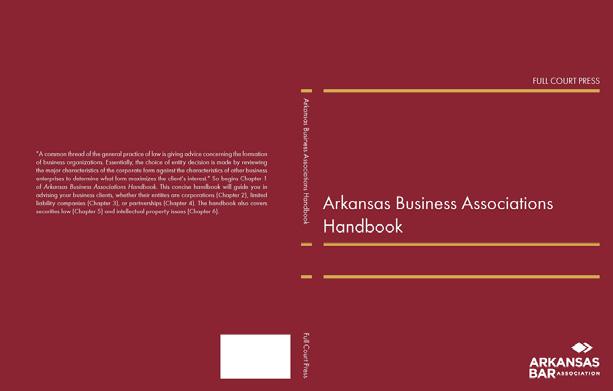
ORDER NOW! FORM BOOKS ARKANSAS PURCHASE THE COMPLETE ARKANSAS FORM BOOK OR JUST ONE OF THE BELOW TOPICS: Business Organizations Edition Criminal Law Edition Family Law Edition Litigation Edition Probate Edition Real Estate Edition Transactional Law Edition Workers' Compensation Edition Also new – Arkansas Business Associations Handbook. This Handbook, together with the Arkansas Form Book – Business Organizations Edition, provides the perfect system to guide you in advising your business clients, whether their entities are corporations, limited liability companies, or partnerships. The new 2023 Arkansas Form Book – available the way you want it. Visit www.arkbar.com/for-attorneys/resourcesnav/publications/practice-handbooks to order.




























































































































































